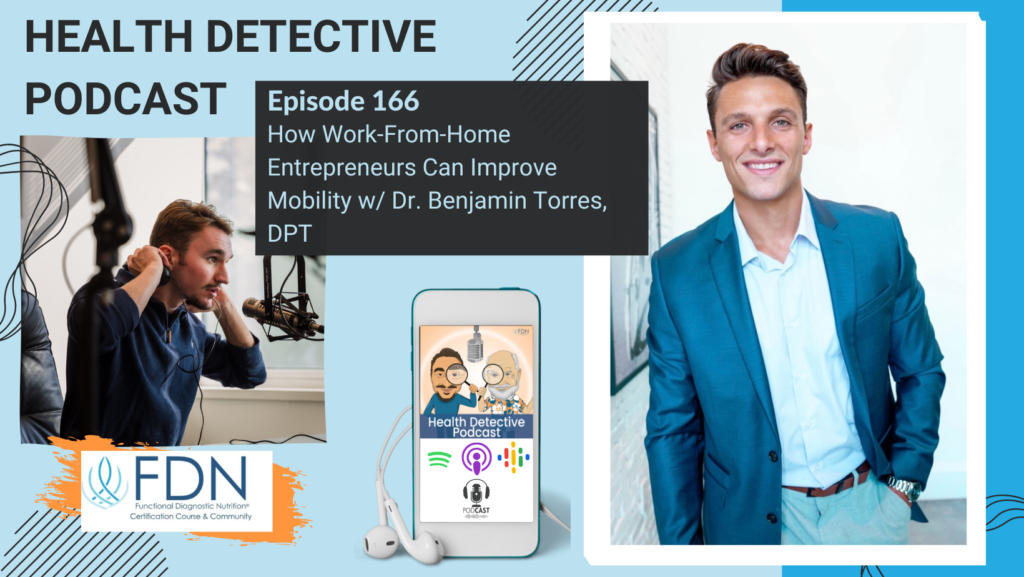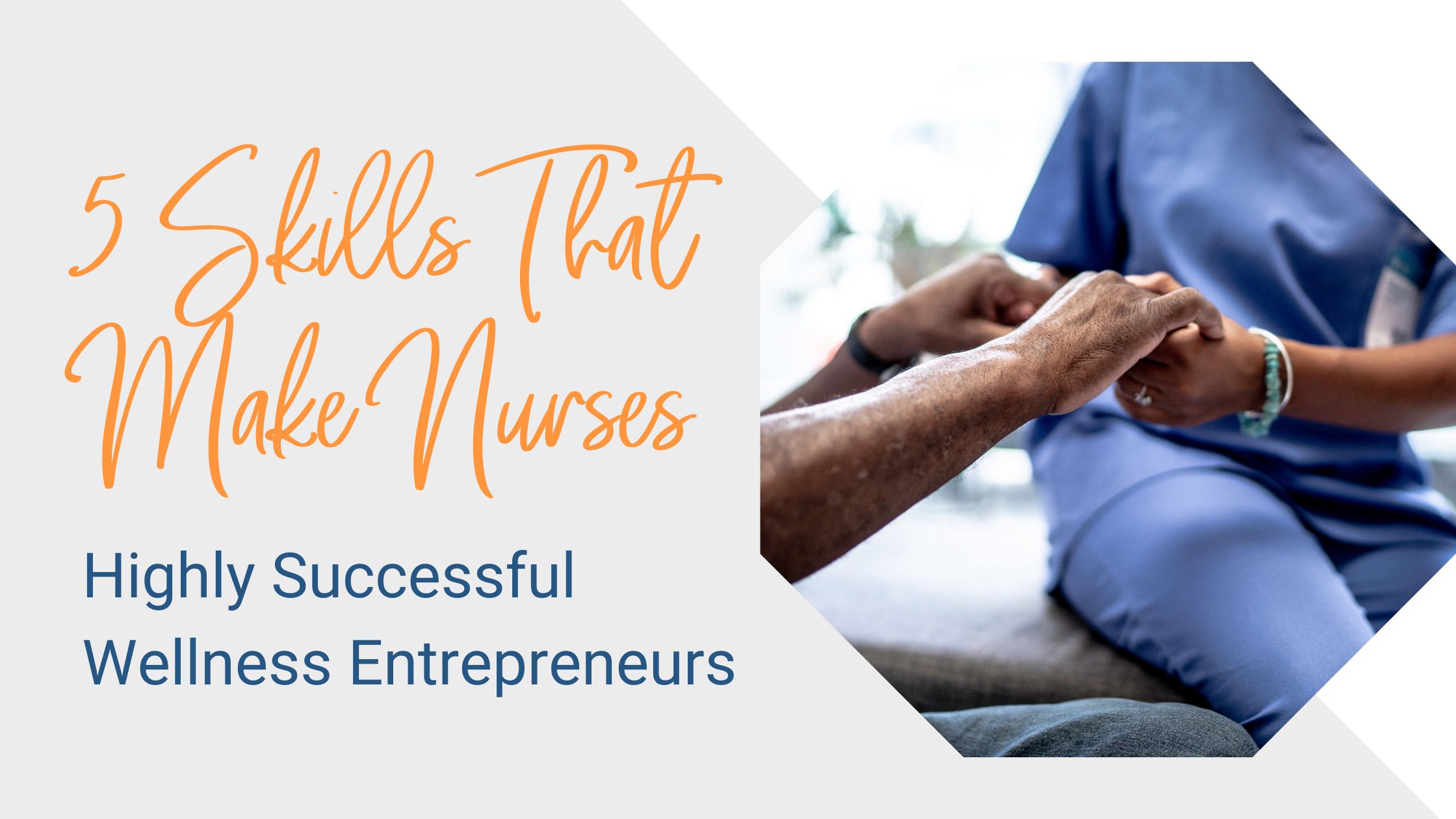Introduction: Work-From-Home Entrepreneurs Mobility
[00:00:00] Detective Ev: Well, hello, my friends. Welcome back to another episode of the Health Detective Podcast by Functional Diagnostic Nutrition. My name is Evan Transue, AKA Detective Ev. I will be your host for today’s show in which we offer some pointers to work-from-home entrepreneurs.
This is a pretty special episode. It’s pretty cool who we have on today. I kind of talk about it a little bit when we are talking to each other, so I don’t want to overdo it right now. But basically, if you’ve listened for a while, maybe you heard a solo episode, I did back in the day.
And if you didn’t listen to that, don’t even bother. I’m about to do another solo one where I kind of share my story in a different sense. You could check it out pretty soon. We’re doing like a more updated version of it cause I think that was back at like episode 40 or something. It’s crazy to think that we’re on 160 something now.
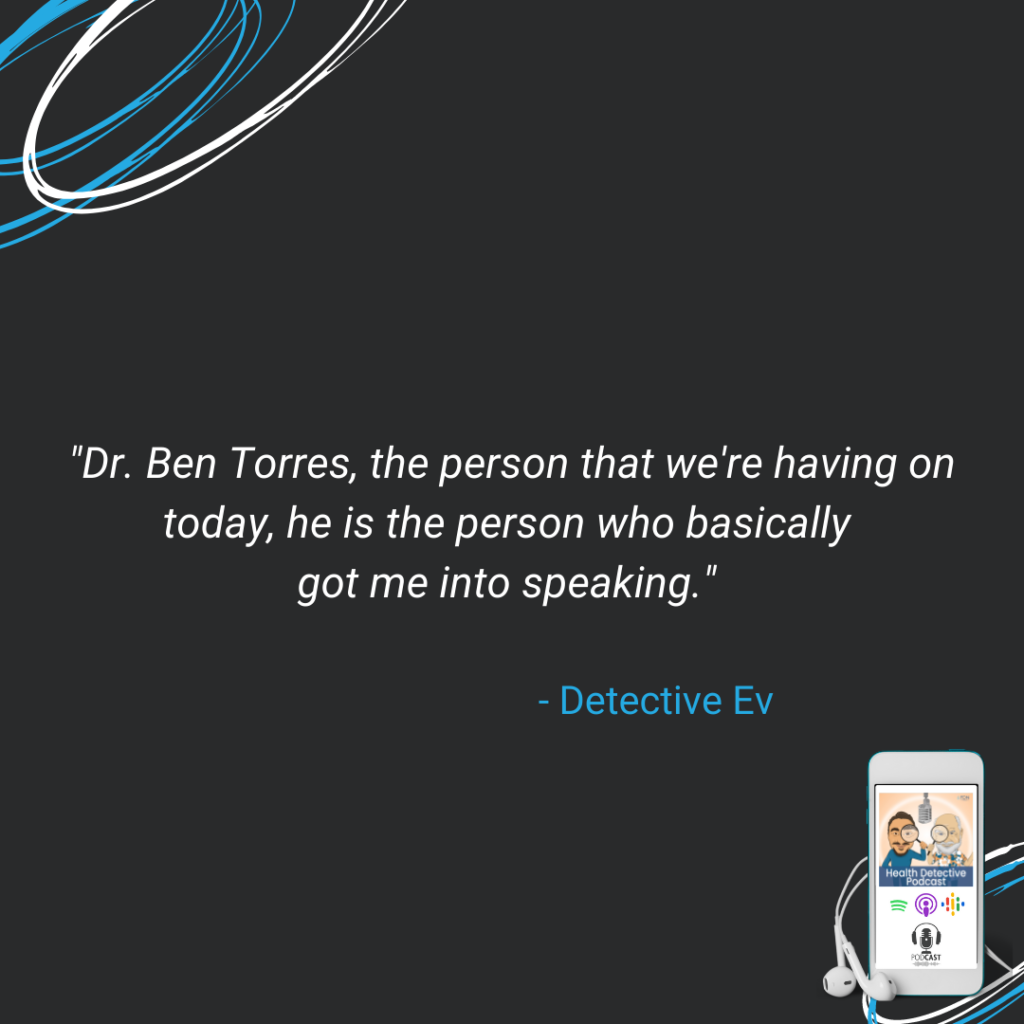
Dr. Ben Torres, the person that we’re having on today, he is the person who basically got me into speaking. I do not mean that he got me into a school or anything like that. We were all in a sales company together. I was at one of the worst times in my life. I mean, it was getting better, I guess, in a sense, but I was coming off one of the worst times in my life.
When Detective Ev and Dr. Ben Met
I had very severe mental health stuff that had just went on. I had gotten kicked out of school. All of my friends are still in high school, about to finish up their senior year, having a great time. I wasn’t graduating, I wasn’t finishing that. So, it wasn’t good. And I was forced basically to go to the community college near us.
I’m not saying there’s anything wrong with that. I just meant forced in the sense that I didn’t want to go. To make people in my life happy, I just went. I went for a semester and a half, basically. During that original semester, I had dropped out of my public speaking course, about two weeks, maybe three. I got to get the actual date down. I hope I’m not saying this incorrectly, but it was very shortly before Ben made me speak at one of our sales events.
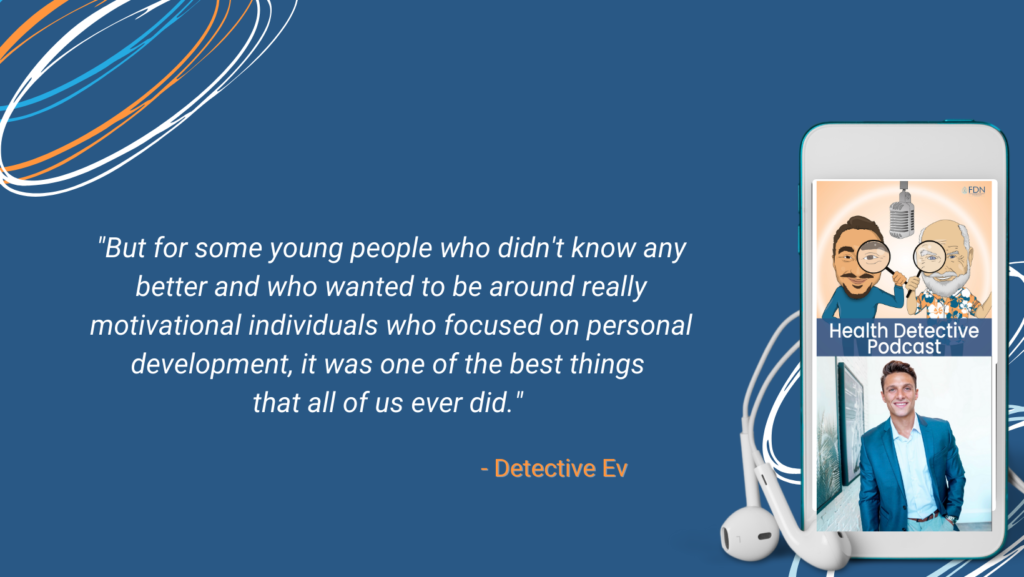
I met Ben through this sales company. I’ll just be honest; it was a network marketing company. I know some people do not like those. We’re not in them now. We’re not promoting network marketing stuff at all. But for some young people who didn’t know any better and who wanted to be around really motivational individuals who focused on personal development, it was one of the best things that all of us ever did.
This was like eight years ago, now. The view on network marketing has become even more negative since then.
Positive Influences
It was cool back then; it was getting a little rougher as we were in it. We certainly had good intentions. We didn’t know what we were doing. We honestly just liked the personal development. We liked being around great people and we liked helping others, that was our motivation. But the point is I liked the products that we were using. They were having a good effect on me.
Basically, it was Ben and this guy, Lane. And God bless Lane, man. He unfortunately passed away in a pretty tragic accident a little over a year ago. Ben was best friends with this guy, but Lane was also part of this group at that time. I was not best friends with him, I was closer with Ben, but I was still very cool with Lane. Lane and I got along pretty well at that time.
These guys, I looked up to them a lot. They were always much more confident in themselves. And I know I come across as a very confident person now, but this isn’t how I was when I was younger, especially not at 18. I mean, I was pretty lost, man. I didn’t really have the ability to speak to people in a productive way. It just was bad.

I looked up to these guys, they kind of have this more or less, like a classic, maybe like alpha personality, maybe that’s it. But they’re very friendly, very good people. They saw in me something that I didn’t see in myself. I believed these guys; this wasn’t like my mom and dad saying this. And I love my mom and dad, but you know, it’s a little different when your family hypes you up, versus these two guys.
Speaking More and Blushing Less
I see the level of charisma that they have. I see the success that they’re having in their life, and they’re telling me I can go do these things. When Ben told me I was speaking that night, I was so nervous because I didn’t know I was speaking.
This was the days where I wore a backwards hat, I had a sweatshirt on, these baggy shorts, some air Jordans, and I think I had just come from dish washing at my family’s restaurant. He told me, you’re speaking that night. I’m like, oh my God, I don’t want to do this, but I didn’t want to disappoint him. So, I did it. I just went up and did it.
I was nervous, but it was different than most speaking. Because most speaking, they force us, like in a school, at least, they forced us to talk about something we didn’t want to talk about. This, I kind of wanted to talk about. I didn’t have the ability to talk, but I wanted to talk about it.
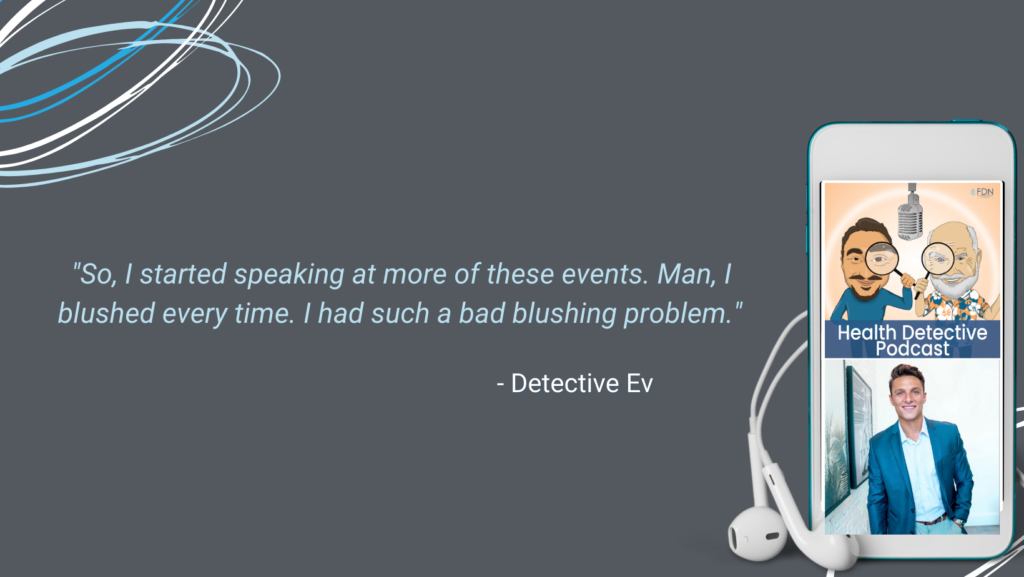
For someone who was that nervous, and for someone who had just dropped out of their speaking course, it was decent. It was okay. Ben even said after, he’s like, dude, that was pretty good. So, I started speaking at more of these events. Man, I blushed every time. I had such a bad blushing problem. You could see it from halfway across the room, if it was a huge conference room or something like that. It was so bad.
But the encouragement that I had from Ben and the rest of this group forced me to keep going through these presentations. I must have presented over 30 or 40 times with this incredible blushing problem until I finally got over this.
About Dr. Ben Torres
If I didn’t have these guys, not only would I never have realized I had a voice for this, I would’ve never gotten into this career that I love. I podcast with you guys. I do mental health speaking to kids as a professional. That is the best thing that has ever happened to me in my life.
And it’s because of the person that we’re interviewing today and the people that he was associated with. We’re not really talking about that stuff today, but I had to mention it. It’s so powerful. I hope that it resonates with you guys, because I know it’s different when we’re talking about our own story. It means something to us that it might not mean to others.
But I would assume and hope that the passion in my voice and the energy that’s coming out, even sharing this story, I can feel it, is being transferred to you. Hopefully it helps get you hyped up. What we are going to talk about today though, is Ben’s career.

He is a physical therapist, Doctor of Physical Therapy. He’s the owner of 180 Body at Home Rehab. He’s also the creator of Online Doctor’s Academy, which is a program where he helps other healthcare practitioners learn how to get online and be successful with it. This is not some guy that is just teaching what others teach.
He has over a hundred thousand organic followers on Instagram. Go check him out on Instagram. It’s Benjamin Torres with two Rs, D P T like Doctor of Physical Therapy, benjamintorresdpt. What we’re talking about today is not anything to do again, with the personal development stuff or all those cool things. I just had to hype that up in the beginning.
Dr. Ben Helps Work-From-Home All-Day-Sitters
What we are talking about today is what he’s been able to do with his physical therapy clinic. So, you guys that are interested in being FDNs, or maybe you’re already practitioners, you can learn something cool from him with how to do this stuff online. But the primary thing that we’re going to be talking about is his own health journey, cause he did have some stuff that was helped positively by FDN. I guess you can’t really help something negatively, I suppose.
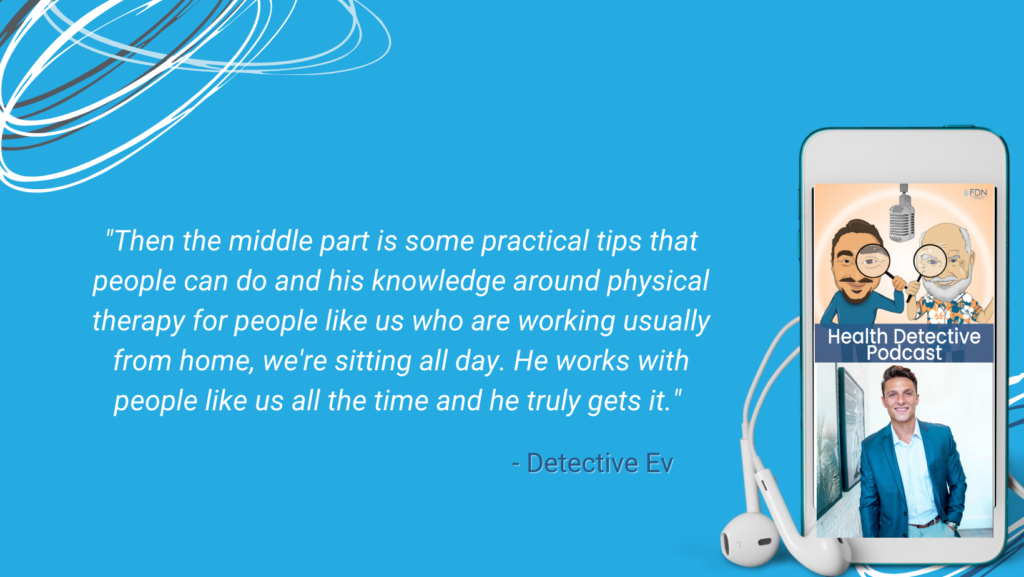
Then the middle part is some practical tips that people can do and his knowledge around physical therapy for people like us who are working usually from home, we’re sitting all day. He works with people like us all the time and he truly gets it. I think you’ll actually learn something there too and get some useful tips.
Now, somehow, I have gone on for almost eight minutes here, I guess, just hyping up my friend. I like this guy. I apologize, but hopefully you enjoyed at least part of this. Without further ado, let’s get to the actual interview.
All right. Dr. Ben Torres. Thanks so much for being here with us today.
[00:07:04] Dr. Benjamin Torres: Of course, man. Thank you for having me. As soon as you reached out, I was like, I’d love to. I’d love to get on to talk to you.
[00:07:08] Detective Ev: Absolutely. It’s always fun chatting.
Public Speaking About Things You’re Passionate About
For those that don’t know, Dr. Ben and I, we’re actually great friends in many ways. It’s honestly fair to say that one of the whole reasons I’m doing speaking, which is something I mentioned a lot on the show and podcasting is because of being friends with you. I’ve mentioned this in my personal story on the show, like all the way back in episode 40 or whatever.
I talked about how I got really lucky to be around a phenomenal group of young adults who were just old enough that I looked up to you guys, but young enough that we also connected. It’s the perfect mix. It’s not intimidating, but it’s not totally like business either. It’s fun. These were the people that encouraged me to get into speaking.
It was Ben specifically, who first made me give one of those talks at these meetings that we had for our sales company. I wasn’t too thrilled about it that day. That was the first time I got to talk about, you were probably in the same boat, that we got to talk about anything that actually helped us.
In school, they assigned us public speaking tasks. I feel like you’re better with this stuff, you’re a very charismatic person. Still, that doesn’t mean you want to go and give some presentation on something you read about, 200 years ago, George Washington, did this. That’s not as exciting.
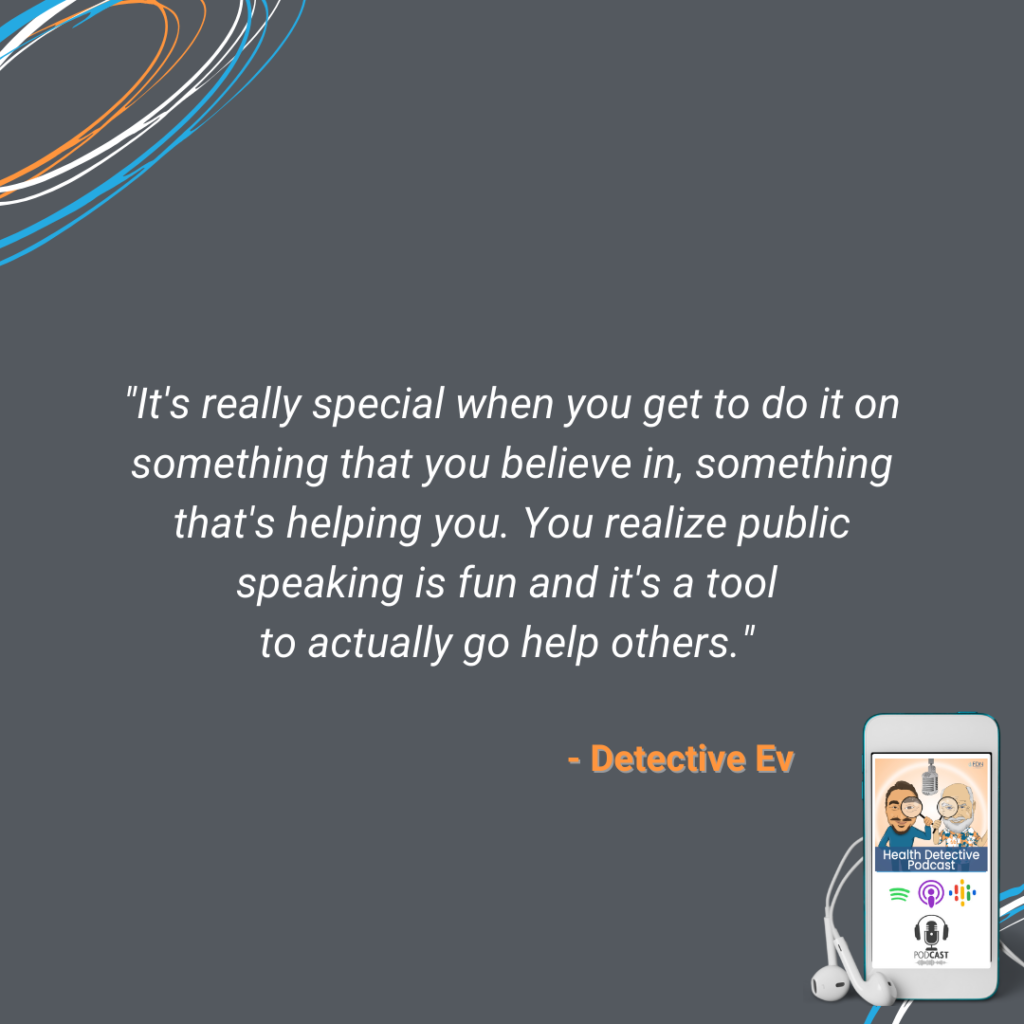
It’s really special when you get to do it on something that you believe in, something that’s helping you. You realize public speaking is fun and it’s a tool to actually go help others. It’s kind of fun, full circle coming around and now the Health Detective Podcast.
Structural Physical Issues Means Stress on the Body
[00:08:21] Dr. Benjamin Torres: I’m just so glad to be on here and to think back at where we first connected and see where we are now and what’s going on now. And how so much of what we talked about back then is where we are today. It’s really cool. It’s really exciting. Like you said, it’s full circle.
[00:08:34] Detective Ev: Yeah, this is proof that the self-help books work right away. We looked really stupid back then, but now it’s working.
But we’re not bringing Ben on to talk about public speaking or anything like that. What’s cool about Ben, as I mentioned, he’s a doctor, and he’s a doctor of physical therapy. So what we’re going to be talking about today is a couple things. One is just the functional side of physical health. Not that we don’t talk about physical health on here, obviously. But it’s more like physical, internal.
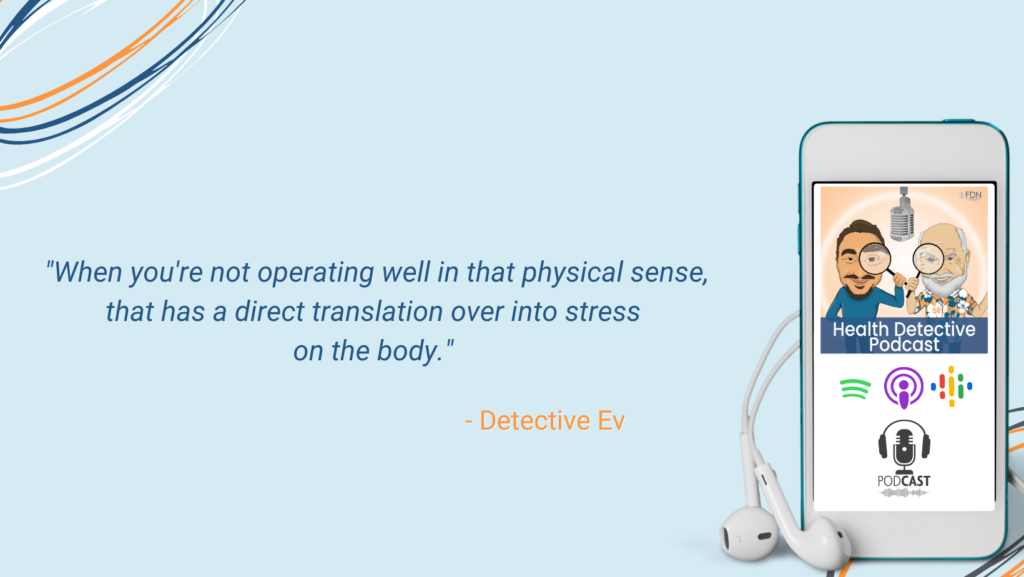
You know, we’re talking about the gut, the brain, detox pathways, all these things. But what I find, and this is something especially true for me, cause you know, I have like my scoliosis, I had the foot injury, the IT band stuff that you helped me out with. When you’re not operating well in that physical sense, that has a direct translation over into stress on the body.
You’re releasing cortisol. This is not good for people with chronic health issues. So, it’s very relevant to this show. And in all the episodes we’ve done, I’ve had physical therapists that turn into FDNs and then came on and talked about FDN. I’ve never had someone talk exclusively about this, so we will be jumping into that today.
Tachycardia in a Healthy, Eighth-Grade, Athletic Kid
But one thing I wanted to just mention before, because Ben’s not really that dissimilar from us. You actually have had some mystery health symptoms throughout your life as well. Tell us about those things cause they started pretty young.
[00:09:38] Dr. Benjamin Torres: Yeah. I appreciate FDN, and Detective Ev here has helped because it honestly made a gigantic difference.
Where I first realized it, because I’m sure it started younger. But when I first realized it was in eighth grade science class, anatomy class. We were doing pulses and we were learning how to take people’s pulses. My pulse was like high nineties. I wasn’t stressed. I wasn’t worried. The teacher thought that the student that took my pulse did it wrong. So, she came over. She was like, have you ever looked into this or checked this out? I was like, no. She’s like, all right, lay down, relax.
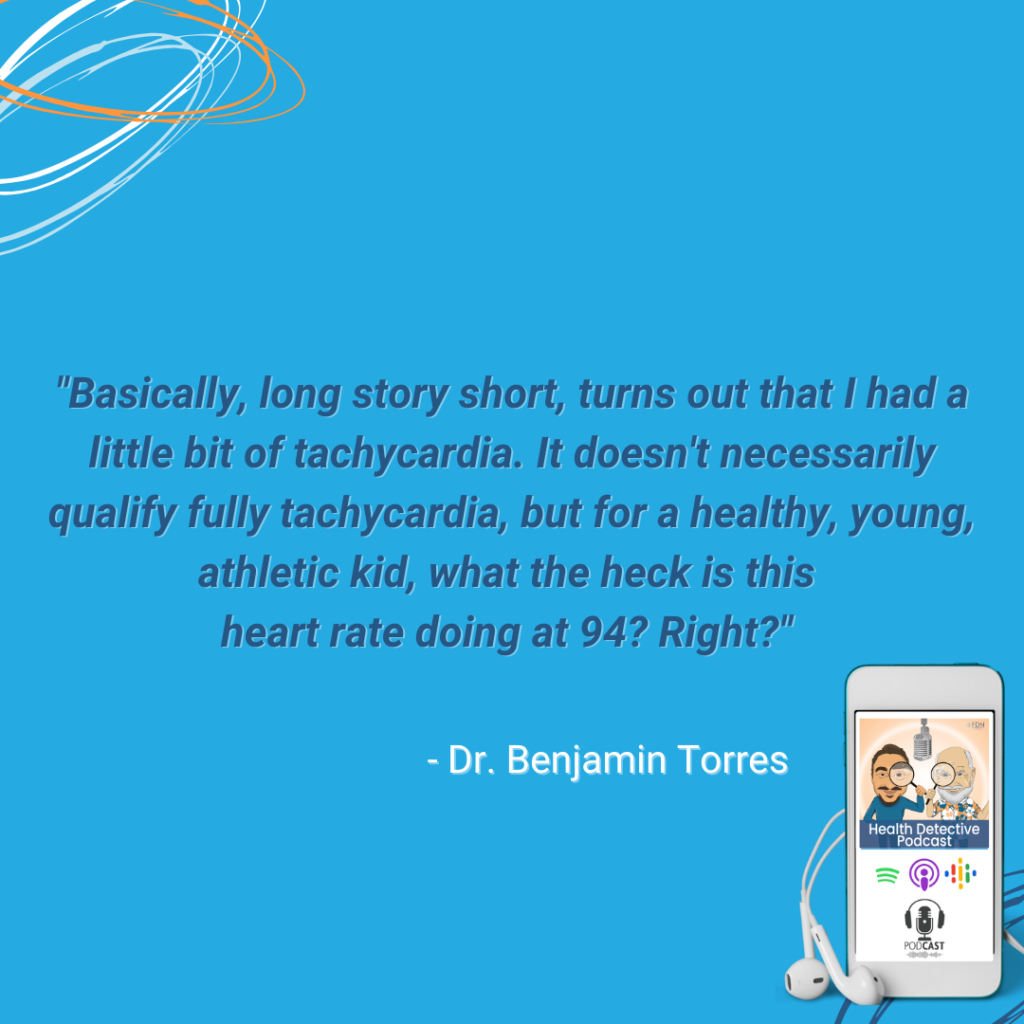
Basically, long story short, turns out that I had a little bit of tachycardia. It doesn’t necessarily qualify fully tachycardia, but for a healthy, young, athletic kid, what the heck is this heart rate doing at 94? Right? It raised some question marks, and I had no idea what it meant back then.
Fast forward, later on, I ended up dealing with, nothing that’s overly challenging, but it was enough that it impacted my life. My recovery after my workouts was really funky. I was dealing with anxiety, and I’d never had anxiety before. I’m not sure if they were directly correlated, these blood sugar issues and these sinus related issues that I was developing, more like just some chronic health conditions that had been going on for years.
High Heart Rate Plus Anxiety
I just wasn’t in a healthy state many years later. And the root of a lot of what I was experiencing, and my challenges were from the heart and from that tachycardia. The big symptom later on was like, I’d go through a hard workout, no stimulant, no pre-workout or coffee or caffeine, nothing. I would intentionally do that to try to see if it had an effect.
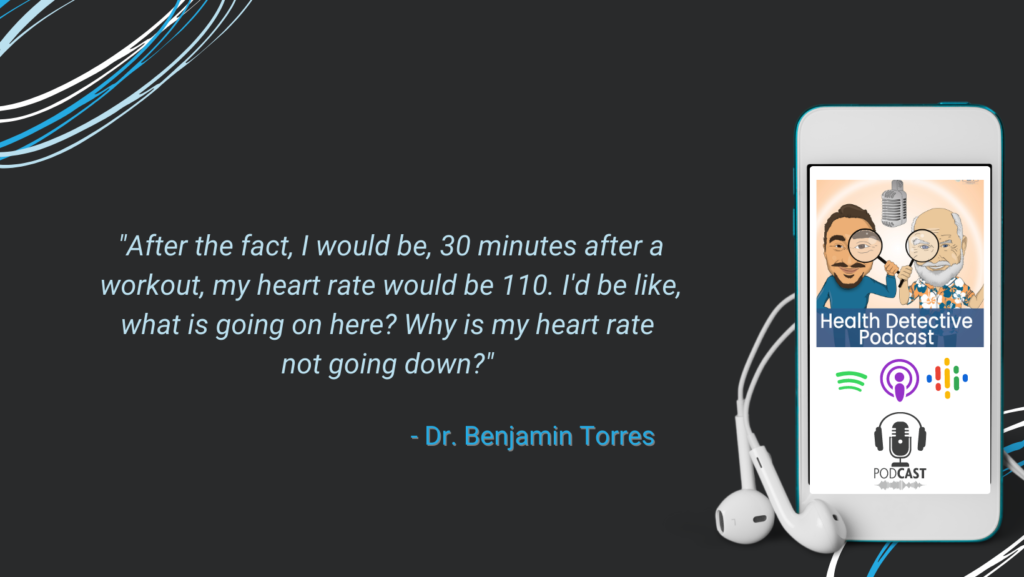
After the fact, I would be, 30 minutes after a workout, my heart rate would be 110. I’d be like, what is going on here? Why is my heart rate not going down? Then that would lead to the anxiety. I was somebody who never had anxiety. Like we talked about earlier, I could go up on stage and speak and it wouldn’t bother me.
[00:11:27] Detective Ev: Yeah, you’re a very chill person.
[00:11:28] Dr. Benjamin Torres: It was very, very weird experiencing that. That was when I had reached out to you actually. I was like, okay, who’s somebody I know can help me with this, that is not a traditional medicine doctor? It’s not where I wanted to go, I didn’t want a prescription. That’s when we went through some of the testing, and I found some really great benefits.
[00:11:42] Detective Ev: And it’s so tough with the anxiety thing, right? As someone, obviously who’s dealt with this. There’s two sides. Anxiety could cause an elevated heart rate, but at the same time, people that get weird physical symptoms also can experience anxiety because of that. It’s very logical that if your heart rate is significantly higher than it should be, especially when you add on that you are, in the sense, a medical professional, who is aware that that’s not normal.
Being Proactive, Addressing the Issues
Now that’s really adding into the psychological stress. It’s like, what came first here? The chicken or the egg.? I’m not sure. But clearly the bottom line is there’s some mystery stuff. It’s stuff, especially with the heart, man, it’s good that you were aware of it and got it addressed. Cause this is something where you look at an otherwise healthy guy.

Ben’s always lifted as long as I’ve known you, you’ve been an athlete as long as I’ve known you. Everything can seem really fine on the outside, and then 40 years old, because it was never known, something could happen. So, I’m glad everything at least got addressed. I’m sure you fluctuate on diet stuff. That’s called being human. But you know how to get this kind of under control if and when need be.
Actually, one of the biggest things for you, if I remember, was the MRT food sensitivity test, which we talk about on this show. For those that are ever in like the West Palm area, because Ben happens to live in that area, send your clients directly to their lab. Because you can actually get the blood draw there.
You don’t have to go to a Quest or anything. I’ll let you share, you had a great experience there, right?
The Healthy Guy with Food Sensitivities
[00:12:54] Dr. Benjamin Torres: They were like excited to see me and showed me around the lab. I met all these people, and really great people. I think it was even the founder or the co-founder’s wife, something like that, was there that day. I was speaking with her. It was just a really fun experience for me. Especially because I am like that sciencey, nerdy background. I love the science behind it.
Like when we would have these conversations about what you were providing me with, I was really enjoying that background of learning, what we were deciphering through. You know, being a detective of the body, like we had mentioned earlier, I loved it.
So, then I go to the lab and see where it was really all done, it was cool. It was a fun experience for me. I would definitely recommend going there if you’re into health.
[00:13:33] Detective Ev: Yeah. We saw some wacky stuff on his food sensitivity test. We saw wheat, which in our world, is so common. But it wasn’t something we were really expecting with Ben.
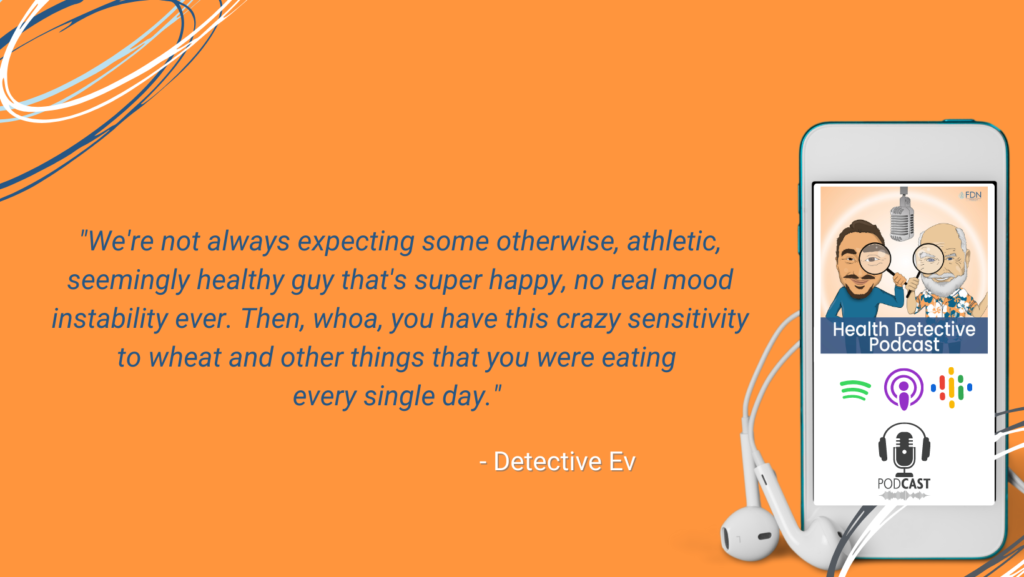
Like the stereotypical profile of someone that we work with, let’s just call it what it is. It’s a middle-aged woman, normally, that’s had symptoms for years and maybe an autoimmune diagnosis or whatever. We’re not always expecting some otherwise, athletic, seemingly healthy guy that’s super happy, no real mood instability ever. Then, whoa, you have this crazy sensitivity to wheat and other things that you were eating every single day.
I remember like, I think the one pepper was on there or something.
Resolving Issues and Reintroducing Foods
[00:14:04] Dr. Benjamin Torres: I used Cayenne all the time. The interesting, and this might be unique, I don’t know, you can tell me. The interesting thing about my experience with the MRT was, I was very strict after the fact and my symptoms dissipated pretty darn quickly, and I felt really good.
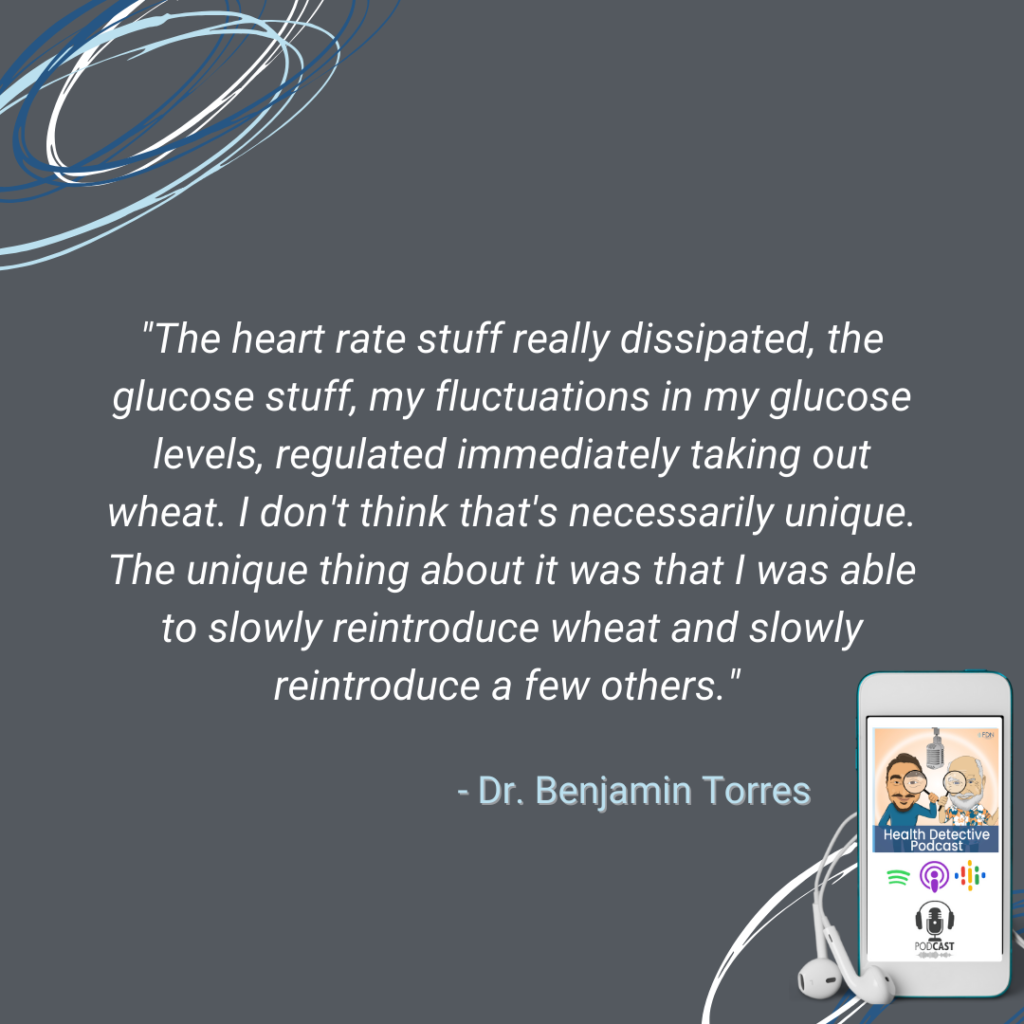
The heart rate stuff really dissipated, the glucose stuff, my fluctuations in my glucose levels, regulated immediately taking out wheat. I don’t think that’s necessarily unique. The unique thing about it was that I was able to slowly reintroduce wheat and slowly reintroduce a few others.
Some of them were weird, like scallops or something. I’m not having scallops every week; you know what I mean? But some of the other ingredients, like cayenne that I was using a lot, I was able to kind of slowly reintroduce those over the course of time. They really don’t bother me unless I have a large amount now.
So, I’m at home and I’m eating pizza and drinking a beer with my father-in-law. That’s going to irritate me the next day if I go for a workout, literally this happened yesterday. My glucose levels were all over. I came in and I felt flush. I was diaphoretic. I was like, oh my God, I could tell my blood sugars were low.
As long as I don’t do that consistently, my symptoms are very, very low now. It’s almost like I had built up a re-tolerance to some of these sensitivities, which is, a testament to the body’s resiliency.
[00:15:21] Detective Ev: With the wheat, I would say it’s a little more unique. But here’s the thing, when we remove any of these foods, it’s never supposed to be permanent.
No Preventative Medicine in Healthcare
Now the wheat stuff, especially in America-based wheat, because of the glyphosate and all the stuff on it, yeah. I mean, sure. Like that’s a recommendation. I don’t need to see a test to know that I would prefer a client or someone who’s sick, not eat it anyway. But you are also a weird case. You might have unique results in the sense that you’re not the typical person that comes to us.
People are banged up normally, and I’m not lessening your symptoms. But like, clearly you were able to live your life for the most part. Right? It’s a little different, you’re not on any medications, there’s no autoimmune, or cancer diagnosis. So, I think this goes to show if we are somehow forward thinking enough to address these things before they become something that we cannot come back from, I think it allows more flexibility.
This is why as FDNs, people listening, we need to be able to push these messages out there to people and show them, get this under control while you still feel pretty good. Then you’re going to be allowed to have this stuff, man. It’s not like these permanent restrictions. No one needs to do that if they got the stuff under control quickly.
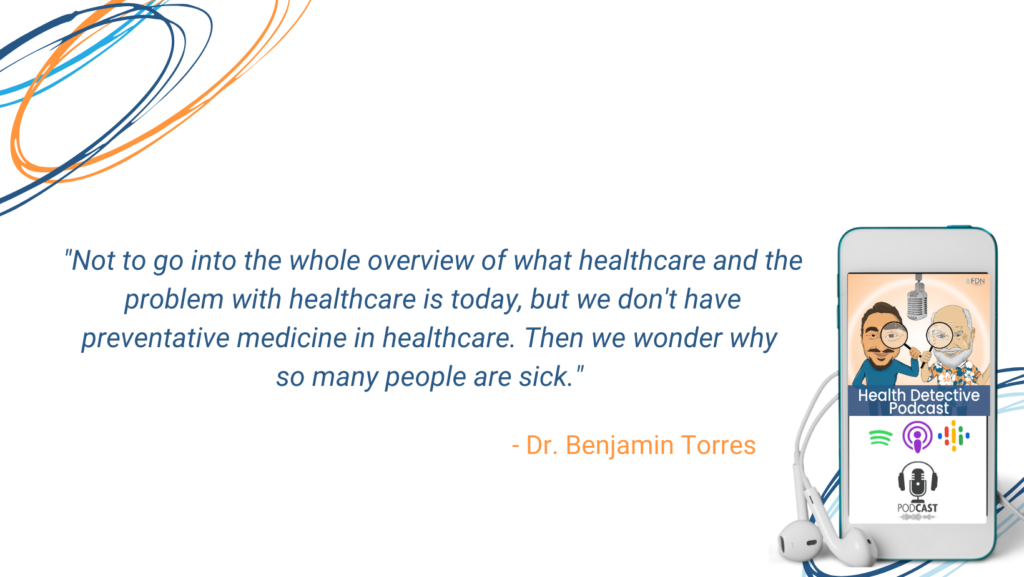
[00:16:18] Dr. Benjamin Torres: Totally agree. Not to go into the whole overview of what healthcare and the problem with healthcare is today, but we don’t have preventative medicine in healthcare. Then we wonder why so many people are sick.
In the physical therapy field, it’s actually non-reimbursable. So, if I provide something that they don’t consider to be a direct treatment or a therapy for a direct current diagnosis, it’s not reimbursed. You will not get paid for it.
Planning Ahead for High Quality of Life
If something is there to have health in the future, or to prevent something that you see the beginnings of, you actually can’t get reimbursed for that. I think it’s a big issue and I can’t agree more pushing the fact that we need to tackle these things when they’re smaller symptoms versus when the person has chronic fatigue to the point where getting up from the couch and walking across the room is exhausting for them. This needs to be addressed earlier on. Cause then it’s tricky.
[00:17:08] Detective Ev: That point that you just made about reimbursement will kind of transition us perfectly. The one thing I’ll throw in first, because there’s some people that haven’t even gone through the course yet or their trainees. I think there’s a lot of good learning opportunities here for someone who’s been doing it longer.

One thing we also got to keep in mind is the person’s lifestyle. I don’t mean to be so dark, but the truth of the matter is we’re all going to die no matter how functional we are. The time is coming after a certain age, we are just decaying more than we’re not. So, at some point we need to be realistic enough and respectful enough to the client to also say, okay, if the decay is inevitable, this is going to happen one way or another. How can we keep their quality of life as high as possible and in a comfortable way for the rest of their life?
And Ben, you have a lifestyle, man. Like again, since you are a laid-back person, you work your butt off, you’re super entrepreneurial. But you’re the classic example of a work hard, play hard, guy. That’s why I like you, right?
Balancing Between Quality and Quantity of Life
You know, you will drink beer, you’ll have some fun. I could whip out beer pong still with you today, I mean, I don’t really do that, but you would do that in a heartbeat at the party after you eat well all day. And you like traveling and trying restaurants and trying these new things.
So, if the person in front of me is not like dying sick right now, you have to start asking the question. Am I actually helping them by telling them to restrict stuff long term, or am I hurting them worse? Because you love your life. Like that’s probably healthier for you than the little wheat every now and then.
[00:18:21] Dr. Benjamin Torres: I completely agree.
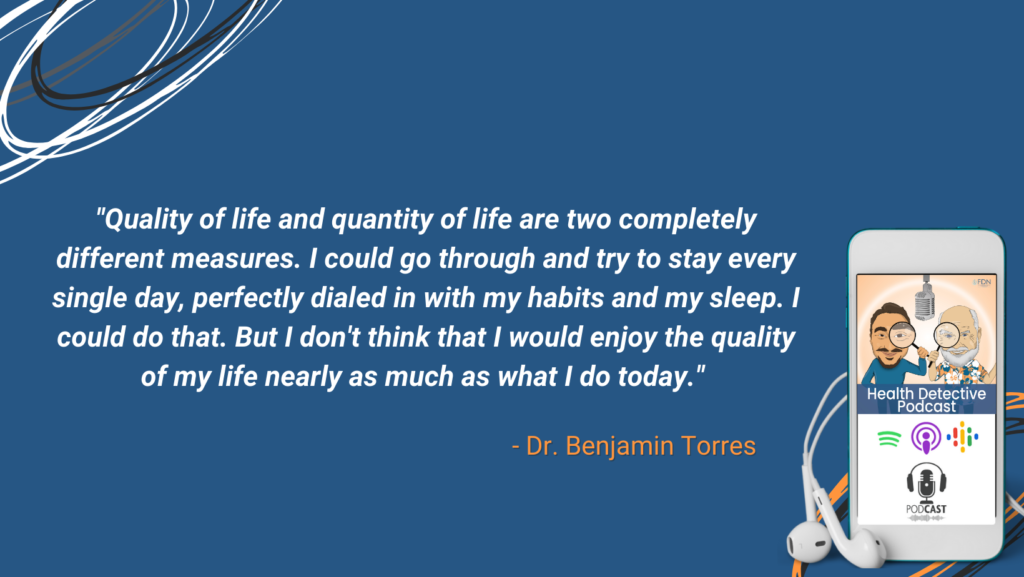
Quality of life and quantity of life are two completely different measures. I could go through and try to stay every single day, perfectly dialed in with my habits and my sleep. I could do that. But I don’t think that I would enjoy the quality of my life nearly as much as what I do today.
Don’t get me wrong. We’re very healthy. Lauren, my fiancé, and I are very healthy during the week, especially when we’re home. We’re on vacation right now. You know, because we both work for ourselves, we can go on quote/unquote “vacation” for a month or so at a time, five weeks at a time. We just kind of bounce around and see family and friends when we do that. Our habits aren’t nearly as good.
We meet up with our friends, we go to our favorite pizza place, right? Like we’re out till one in the morning and we have five drinks, right? Those habits are not my norm.
Have a Fun Life and Be Healthy Too
During the week, me and Lauren are usually very strict. Then when it comes to a Saturday, it’s whatever we want to do. It’s five to six days of the week, me and Lauren are really very serious about our eating habits, and we cook every meal. Then it’s usually Saturday or Sunday, we choose one or the other, we just enjoy life and that’s kind of the balance for us.
Then we go on vacation, we don’t think much about it. We just control our controllables.
[00:19:35] Detective Ev: That’s the key word. You guys have nailed balance in my opinion. When I look at you from an outside friend perspective, that’s what I see. This is a great way of doing both things. If most people that are in FDN or clients of FDNs, learn to do that balance before they got super sick, they probably wouldn’t have these issues.
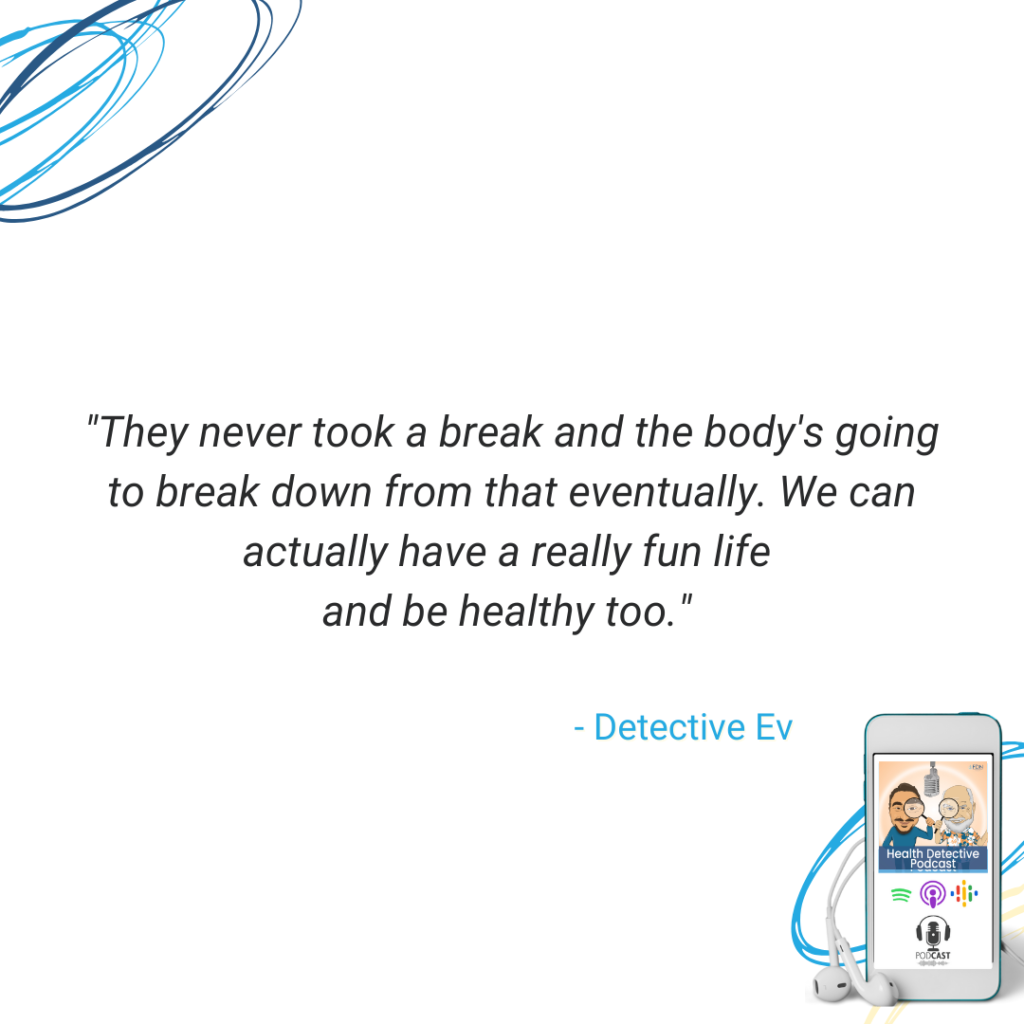
Listen, I understand guys, some people like me, yeah, we were sick really young. I understand that. We didn’t have a conscious decision in the balance. But no, I hear a lot of people, it was 30 before they got sick. They were living that Type A, 90 hours a week life. They never took a break and the body’s going to break down from that eventually. We can actually have a really fun life and be healthy too.
Because yes, I don’t want to underplay this. You guys, FDNs are so extreme on one end. Like no, compared to the average people, you and Lauren are very great with this kind of stuff. You ‘re always fun friends to talk to about these things, cause you actually read the books. I can talk to you about the health things, and you get it.
Going the Non-traditional Route
Anyway, enough about the story. I do want to make sure people get the physical therapy stuff today. How did you even decide that? Once I met you, you were already in college and you kind of had that plan in your head. I know there was one time where it’s like, all right, do I want to skip the higher-level college completely, but I’m so glad you did it. I’m sure, you’re glad, cause it’s worked out great.
But why even physical therapy? Like what made you want to do that to be begin with?
[00:20:44] Dr. Benjamin Torres: You know, initially it was my father’s recommendation. My father was in healthcare, home health. He was like, you should look into it. You get to work with athletes, and you know, if you’re not going to the NFL, maybe you could work with somebody in the NFL.
That was one of his first pitches for me to be a physical therapist. I took an aptitude test actually that came out saying you should either be a doctor – a traditional style doctor, a physical therapist or a personal trainer. Those are the three that came up. I was like, huh. All right. I didn’t really want to go down the traditional medicine route.
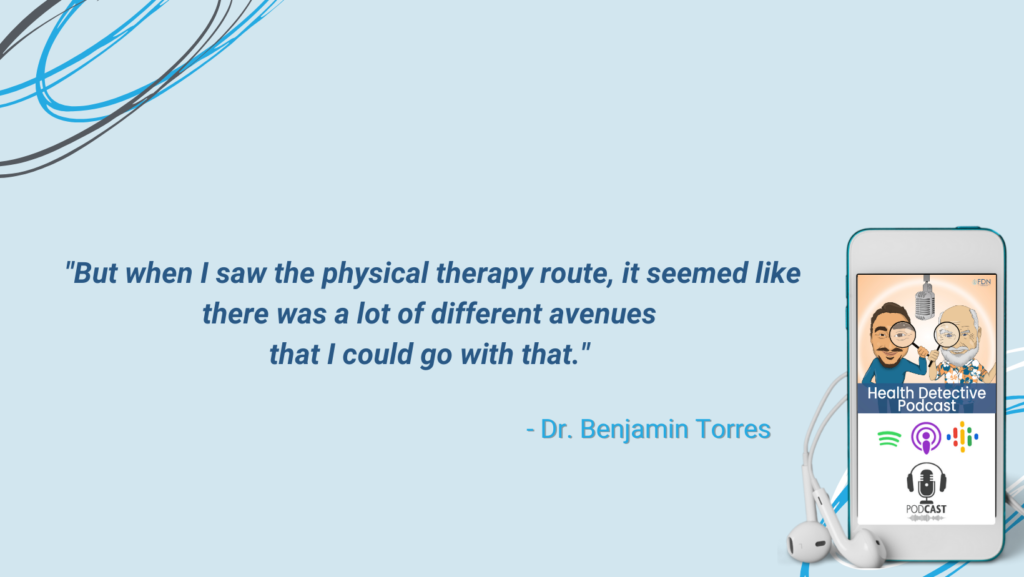
I have never been somebody who’s big on the system. I have never been somebody who’s big on traditional things. Which is why I’m an entrepreneur. Right? But when I saw the physical therapy route, it seemed like there was a lot of different avenues that I could go with that. Then I shadowed somebody, and I was like, okay, I could see myself doing this.
Nailing the Online Stuff Before It Was Cool
I didn’t realize the path that I was going to take after college and how different it was going to be from where the traditional realm of physical therapy is. But I’m glad that I did. My gosh. I mean, it’s changed my life for forever.

[00:21:35] Detective Ev: So, you were in Pennsylvania, originally, with Lauren, his fiancé, just to be clear. What happened is you guys ended up moving down to Florida and you had a great opportunity down there. But Lauren, and dude, this was so cool to have her in our friend group. Because before anyone else, Lauren was pushing the online stuff. She knew she could do it.
So, for everyone that knows like how many personal trainers there are online, Lauren was doing this before it was cool. It wasn’t even really like a genuine proof of concept yet. It was just like; I think I can do this and I’m going to do it.
We’d all be hanging out and every single time, she’s very fun, but then, hey, I’m taking my hour and I’m doing my social media stuff. Then she would make you do the hour and follow people before you even graduated. It was just an incredible ability to think three, four, or five years ahead with this.
So, you’re in Florida, she’s in the online life. She nailed it. And you are at a high-level position because of all this personal development stuff and leadership work you’ve done over the last several years. You were able to accelerate so much faster than just someone coming out of school normally. You’re in managerial positions already, but there was something kind of missing there. What was missing when you were working with these people?
Lack of Fulfillment, Different Values, and Inadequate Pay
[00:22:37] Dr. Benjamin Torres: It was a lack of fulfillment. I did not like the system that I was in. When I looked at the 10-year outlook of who I would become if everything happened perfect. If I continued to accelerate inside this successful company, I continued to climb the ladder and I got as successful as I possibly could, let’s say I was a VP of this company, right? I still would not like what I was doing and the model in which they were doing it did not resonate with me. Their values were not my values.
I noticed that was kind of the case for every traditional, outpatient, physical therapy, orthopedic style job. None of them had the values that I had and none of them were giving the time to the patients that I wanted to give to them. That’s when I realized I had to make a change.
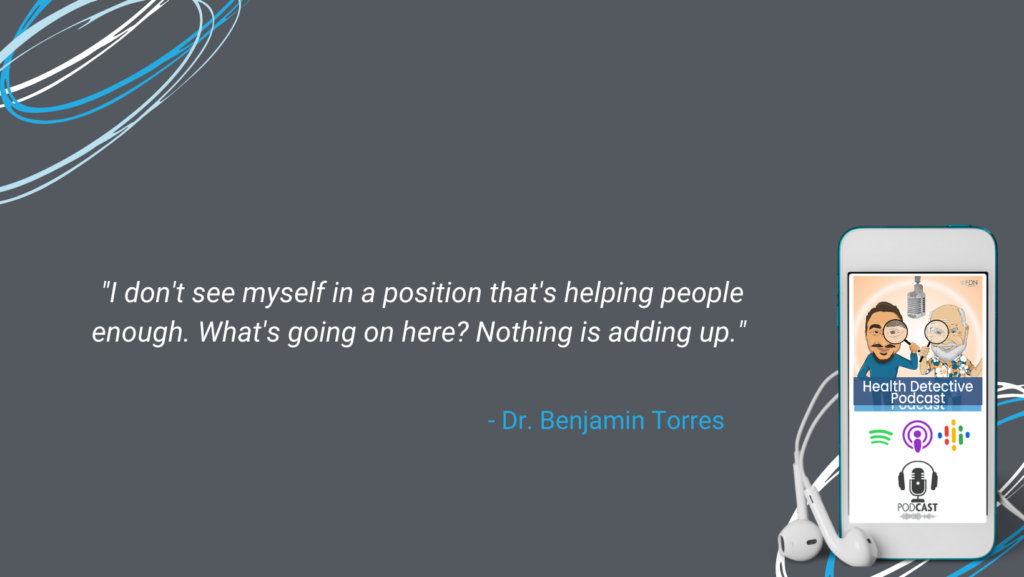
Also, the demand of the job and what the pay was, did not correlate. I mean, I was working so hard, and I was making like 70, $80,000 a year. I was like, wait a second. You know, I got this Dr. In front of my name. I worked my butt for forever to get that. Now I’m working in the same amount of hours and I’m still not earning enough. I don’t see myself in a position that’s helping people enough. What’s going on here? Nothing is adding up.
I’d look at so many of my friends, and especially Lauren, in this online realm, living a lifestyle that I wanted to live. I knew if I transitioned to that, it would free me up to help more people. So that’s really what pushed me to transition was my surroundings, my environment.
Work Smarter, Not Harder
[00:23:59] Detective Ev: That’s so important. I was laughing cause I’m thinking in my head, everyone’s for working hard, especially our group of friends. No one’s not advocating for that. But it’s so clear, the harder you think about it, that working hard, has a limit.
Let’s use Elon Musk, just the idea of his work ethic. The guy reports working about a hundred hours a week, I think that’s accurate. I know plenty of people who are pushing 80, 90-hour weeks cause they’re nuts, and are not making even a 1000th, a 10000th of what he’s making.

At some point we have to realize there’s only 24 hours in the day. There is a physical limitation on how hard a human being can work. And there’s actually many people, not saying it’s the majority, but many people do max that out. They push the potential of what a human can do seven days a week. It’s pretty incredible. I’m not advocating for or against it, I’m just saying people do it.
But within those hours that you’re spending, some learn how to work harder, some learn how to make themselves more valuable and bring more value to those hours. Then by definition, they get more income.
The reason I was laughing is because I can’t even imagine. You’re a smart guy, you know you can make good money. You’re sitting there working your butt off while having to clock into this place. Then the friend group that you have down in Florida, I’m thinking of people like Scott or whatever.
This kid, working hard, but killing it online. Doing some pretty serious numbers and helping people doing good things, all ethical. Like it has to change your mind set, wait a second, maybe I could figure that out.
An Unhealthy Work Life
[00:25:24] Dr. Benjamin Torres: In terms of a level of education, my level of education in that friend group destroyed everybody’s. And yet my income was like a quarter of what some of these guys were doing. And I was working harder. I was like, all right, okay, wait a second. What’s going on here?
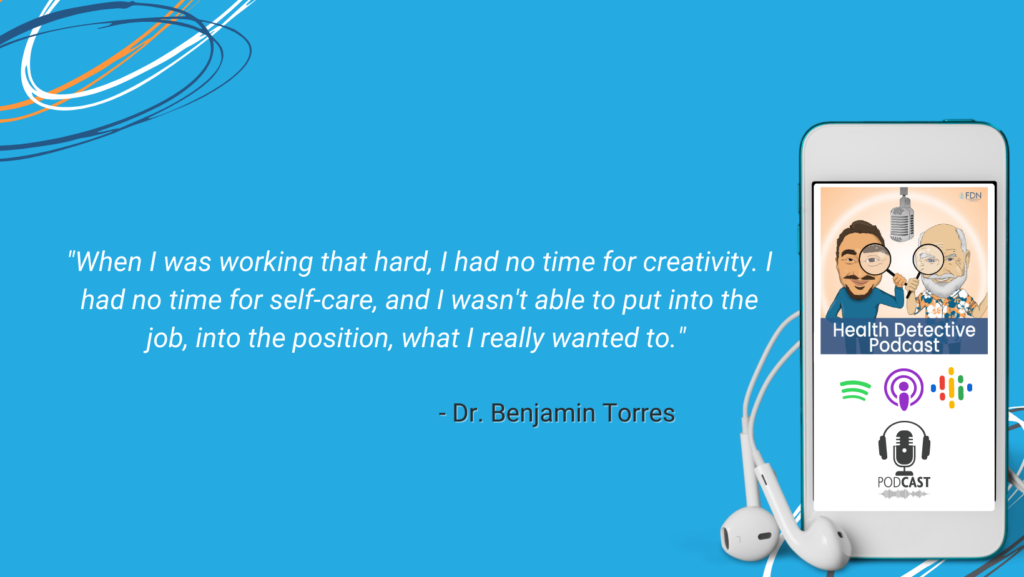
And I think this is an important note. When I was working that hard, I had no time for creativity. I had no time for self-care, and I wasn’t able to put into the job, into the position, what I really wanted to. When I work with somebody, whether it is a patient or whether it is a business owner that I’m looking to help, I need to have myself fulfilled at a hundred percent to be able to give a hundred percent to these people, because I am locked in on these calls. I am trying to give every single part of my knowledge and my effort towards them.
When I was gassed at the clinic after 80 hours, I’d walk in there, it was like survival, right? Like get through the morning, you know? That’s not where I want to be in my life. I think that I can help more people and have a larger impact, even if it’s doing less. Because I have more time for me, so that way I can give more into the people that I am helping.
Cash-based is Harder but More Effective
[00:26:33] Detective Ev: Let’s get into some of the meat and potatoes, like the nitty gritty and technical stuff, some things that maybe people can bring away with them today.
One of the types of people that you work with a lot now, because you did effectively transition into the online thing and it worked out very well, increasingly so. That’s amazing. It’s opened up your doors a lot because something that I feel like our group might be able to relate to more is like the chiropractors we go to guys. For those that don’t take insurance, the chiropractors that don’t, you know, the reason they don’t take insurance is not because they don’t want to. Why would they want to do that per se?
It’s because it allows them to do things that they want to do. They want the money, of course, they got to make income, but it makes it harder when they can’t take insurance. However, it allows them to be more effective chiropractors, at least, that’s what they believe. In terms of your world, Ben, it’s a conceptually similar thing.

That analogy might be relatable to our audience where there’s certain things that you could do in person with someone through insurance. But then, if they’re willing to pay a fee online, out of pocket, it kind of opens up your doors for what you’re allowed to offer people. Right? And that’s turned out to be a very good thing for you.
Cash-based Allows for Freedom, Creativity, and Time
[00:27:30] Dr. Benjamin Torres: Essentially what my model does is it removes insurance as a blockade or a limiter to my services. That’s the most basic premise of it. I’m here to provide you anything you need and any amount of visitations for however long we need, so long as you’re willing to pay out of pocket for it. That exchange is saying, I don’t want the cheapest option, I want the best option.
So, if somebody needs me to see them for six months and we need to visit with them every single week, then that’s where I’m going to be. How many insurances would allow for that reimbursement? Never. If somebody needs 20, 60 minutes of my time on a call where we are looking through every detail of their past medical history, what every single detail of their movement looks like, that is built into what’s causing their pain and their issues, I can do that with them because I don’t have a schedule with 47 patients on the day.
Removing that aspect of insurance and getting into the cash-based realm has totally removed that blockage. It’s allowed for me to spend way more time on the individuals. That’s why I see very unique cases. Why people come to me after they see eight, 10 practitioners. They’re like, how did you find this?
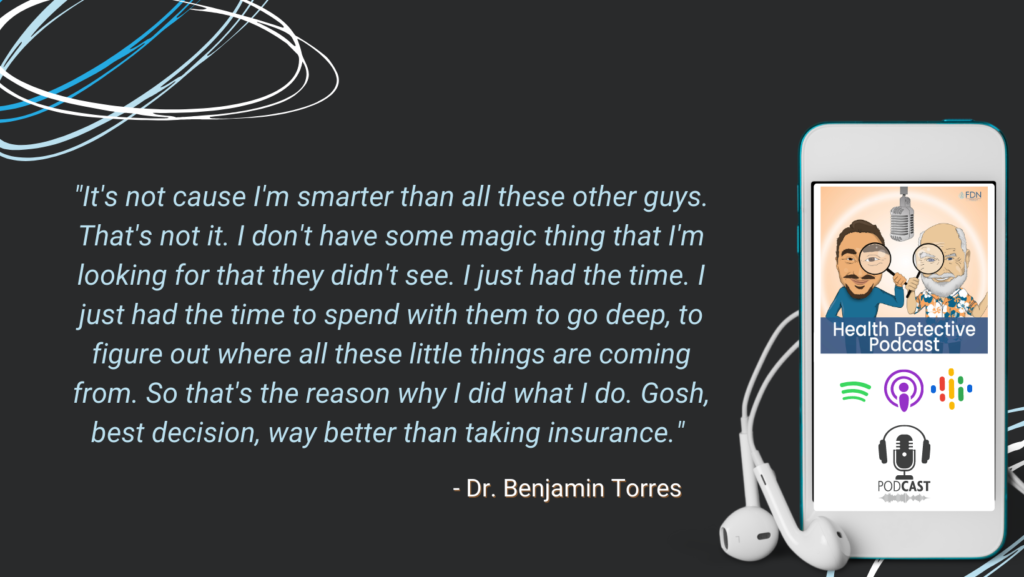
It’s not cause I’m smarter than all these other guys. That’s not it. I don’t have some magic thing that I’m looking for that they didn’t see. I just had the time. I just had the time to spend with them to go deep, to figure out where all these little things are coming from. So that’s the reason why I did what I do. Gosh, best decision, way better than taking insurance.
Work-From-Home Posture Can Lead to Bad Movement Patterns
[00:29:01] Detective Ev: The time thing that is so relatable to us as FDNs. Because a full-time maxed out FDN making significant income is still, probably, only working with an average of like 20 to 30 clients at any given time. Now, I’m not saying that’s not a lot, but I mean, we’re talking maxed out. Full time, great income.
So, compared to a doctor who would see that amount of people in a single day, you know, would actually be required to see that amount in single day just for the quota. It’s a completely different experience.
Again, in terms of the people that you’re working with, I know that you get unique cases. A lot of the times though, the stereotypical person is someone working from home, maybe a virtual type person, which totally isn’t any of our coaches. Hypothetically, in case any of those people are listening, what are some common things that maybe you’re seeing wrong with the person’s posture or maybe common pains that they have as people who work from home and work online and sit at home?

[00:29:53] Dr. Benjamin Torres: That is a huge component of what I see. Individuals are active, healthy individuals, but the positions that they are in throughout the day are predisposing them to bad movement patterns when they are active. Whether it’s running form, squat form, bench overhead press form, whether it’s Pilates or yoga class, right?
Regardless of the physical activity, their habits throughout the day, and this is from years and years, and years and years of buildup, has put their body in a certain alignment and a position or a certain amount of weakness or imbalance, that then shows up tenfold when they work out.
Treating the Whole Person, The Work-From-Home Structural Imbalances
An example of this would be somebody who’s at the computer or desk for prolonged times, like 90% of the population, this kyphotic style positioning is forward, rounding style positioning. Not a big deal when we look at generalized health.
People over exaggerate the impact of posture during the day. Most of the studies say, yes, small impact, right? When we see it through exercise is when it makes the difference. That kyphotic positioning narrows the amount of space, the axial space in the shoulders. There’s less space for the tendons to glide. This kyphosis of the thoracic spine, where it’s getting rounded in terms of positioning, limits overhead movement.
Then we have to compensate from the lumbar spine for more lordosis and more extension, which puts pressure on the low back. You can imagine if this individual goes from sitting at the desk all day long to trying to do Olympic moves, power lifting moves, snatch clean and jerk overhead, and they don’t have overhead motion, they’re going to deal with shoulder injuries, upper and lower back pain, disc-related conditions in the neck and in the low back. That’s where a lot of the time I see that person.
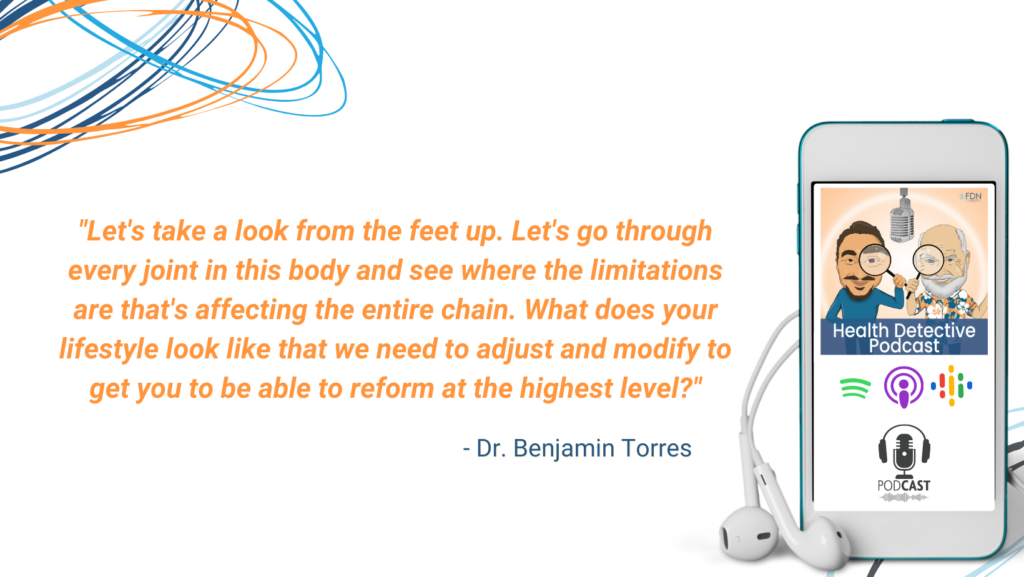
The average practitioner says, you’re dealing with shoulder pain? Let’s take a look at the shoulder. What I’ll do instead is, you’re dealing with shoulder pain? Let’s take a look from the feet up. Let’s go through every joint in this body and see where the limitations are that’s affecting the entire chain. What does your lifestyle look like that we need to adjust and modify to get you to be able to reform at the highest level?
That is the correlation between the habits during the day and how they play out.
Work-From-Home Good Habits Eliminates Pain
[00:32:04] Detective Ev: This is interesting cause I feel like what you just described intentionally or not is a holistic approach. What we do, right? We always talk about an FDN, I mean, it gets beaten over your head is we don’t treat the symptom, we treat the person.
So, if someone has a mental health condition, amazingly, even though, as you know, FDN was the only thing that ever worked for me, mental health wise. No one ever said, okay, Ev, this is what we’re going to do for your anxiety. No one said that. They said, we’re going to look at these other things in the body, things that we see going wrong. We’re going to address that.

Then by definition, someone who has a properly functioning body should not have anxiety. Similarly, it sounds like someone that has good posture and good habits elsewhere should not have the shoulder pain or these other things that come up.
That was an interesting thing. I didn’t know that what you just said about the studies being almost over exaggerated about the posture, I would’ve thought that was a bigger deal. Are you saying that people can survive with those poor postures during the day and then do things to help for the exercise? What’s the solution here? I know it’s customized for everyone, but generally speaking.
[00:33:00] Dr. Benjamin Torres: Sitting posture is over analyzed. What I mean by that is that people think, oh my gosh, if I’m slumped in this chair and I’ve been doing this for an hour, I’m going to ruin my body. Basically what we found is that’s not true.
Work-From-Home Continual Position Adjustments
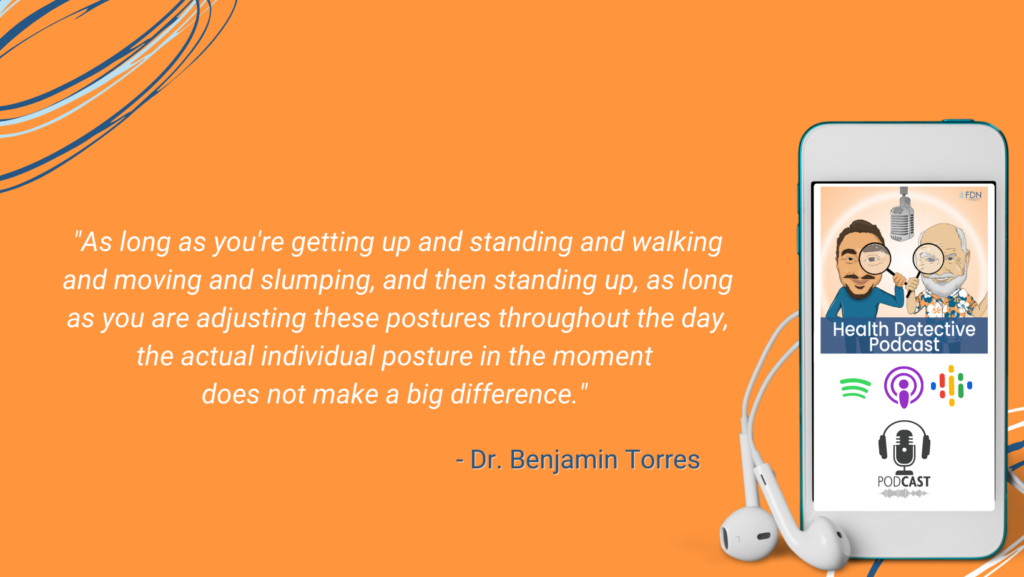
Okay. The only thing you really need to do is get a new posture. Your posture can be crap. It can be this slumped over leaning sideways posture. It won’t really have an effect as long as you don’t stay there long and you’re moving, and you have a balance between the postures that you are achieving. As long as you’re getting up and standing and walking and moving and slumping, and then standing up, as long as you are adjusting these postures throughout the day, the actual individual posture in the moment does not make a big difference.
Now, if somebody were to sit in the exact same posture and let’s say they had some kind of a job that required them to sit for eight hours straight and they almost never got up, which is something I see, that’s an impact, right? We’re seeing an impact there; this needs to be addressed for sure.
Or somebody who assumes the same postures repetitively, whether it be somebody who stands and pops a hip out, or somebody who constantly carries something on one side or is constantly using a mouse on one side. We see these imbalances in the hips and the shoulders and the spine. Yeah. Then it needs addressed because it will change every movement pattern they do.
But just taking a look at somebody’s basic standing or sitting posture, and being like, send a picture of you at the desk and then overanalyzing how they sit at the desk, they’re not sitting in that posture for long. Don’t spend too much time there. It’s not having the impact that we might have thought it did 10, 15 years ago when posture was like the number one thing that the therapist worked on.
A Short-Term Work-From-Home Slumped Position
[00:34:40] Detective Ev: You’re like the equivalent right now of an FDN saying, well, you could have like chocolate cake. It just has to be like gluten free, right? You feel really good about it. It’s like a great excuse.
For me, I’m thinking already at like the end of the day, my habit usually is I like to be just relaxed. I have my blue light stuff, but I like to be on the computer relaxed for like the last two hours of the day. It seems to work fine for me. I sit in like a nice chair, but I always kind of have that, like, it’s been the end of the day. Ah, just like a more like relaxed laying back type of thing. It’s only for that couple of hours. It doesn’t hurt, that’s for sure. If anything, it almost feels kind of good.
Then I go to bed afterwards and it’s nice after that. I don’t know that I would recommend it per se.

[00:35:12] Dr. Benjamin Torres: I’ll comment on that. Slumped posture in studies has shown to have a decreased pressure on the lumbar spine versus an upright erect posture. This is again for the short term. Somebody sits in a slump posture for eight hours, you’re going to have symptoms, right.
A relaxed lumbar spine, the lordotic posture, that upright positioning that the spine is in quote/unquote, “perfect posture,” a relaxation of that, actually has an alleviation on the joints in terms of tension and pressure. If you feel comfortable at the end of the day sitting like that for 30 minutes or an hour, don’t feel like you’re doing something wrong, you’re not.
A Short-Term Work-From-Home Reclined Position
And a slightly reclined position has shown to be the same thing. That’s actually the best position for the body to be in. If we’re talking about decreased stress on a joint is like 20 or 30 degrees of reclining. So, if Detective Ev, you are kicking it at the end of the day, feet up, leaning back on a chair, slumped over, scrolling through something on your computer, that’s all right.
[00:36:15] Detective Ev: Perfect. That’s exactly what I do. And it is, I couldn’t really do it right on the video, but that’s what it is. It’s a reclined, slightly back, and it’s more chill, so I love it. People are going to love you even more now. This is great.
Commercial Break – Try the FDN Course for Free
Hey there folks, it is Detective Ev popping in here really quick.
Maybe you’re listening to this episode thinking, you know what, these guys are alright. I like them. They look like they’re having some fun in their lives, helping people, changing the world through functional healthcare. Maybe you would like to be doing the same thing.
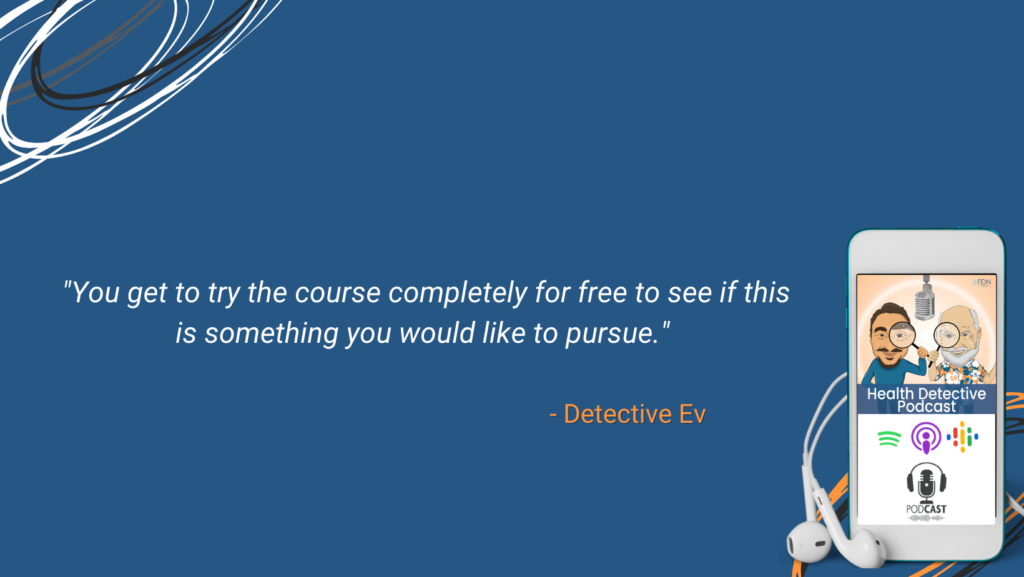
If you’d like to do that through FDN, you can go to fdntraining.com/tryfdn to try the course completely for free, no credit card required. It’s not a trial. It’s nothing like that. You get to try the course completely for free to see if this is something you would like to pursue. That is fdntraining.com/tryfdn.
Since I gave you guys yet another long intro, this is all there is for the ads. Let’s get back to the show.
Work-From-Home: Strength Training is Essential
We’re very similar here and I want to kind of continue the conversation in this route, FDNs have general principles. I could tell anyone that it’s a good idea to probably fall asleep around 9:30, 10:00 and try to get eight hours. That’s very general advice that is not going to hurt most people. Getting outside in morning sunlight, you know how big I am on that. That’s just natural. No one’s not supposed to be doing that. Walking. If they are physically able to walk would be a good idea. Then if I’m working with a client I might realize, this specific supplement might be a little more beneficial right now. You might need to remove this food cause it came up on the test.
So, I understand that on a video call podcast, we can’t talk about the specific supplements. You don’t know people’s cases. But certainly, you probably have general principles or ideas that could apply to anyone. So, what are some general things that you think would help out our people that are sitting online all day, helping their clients?
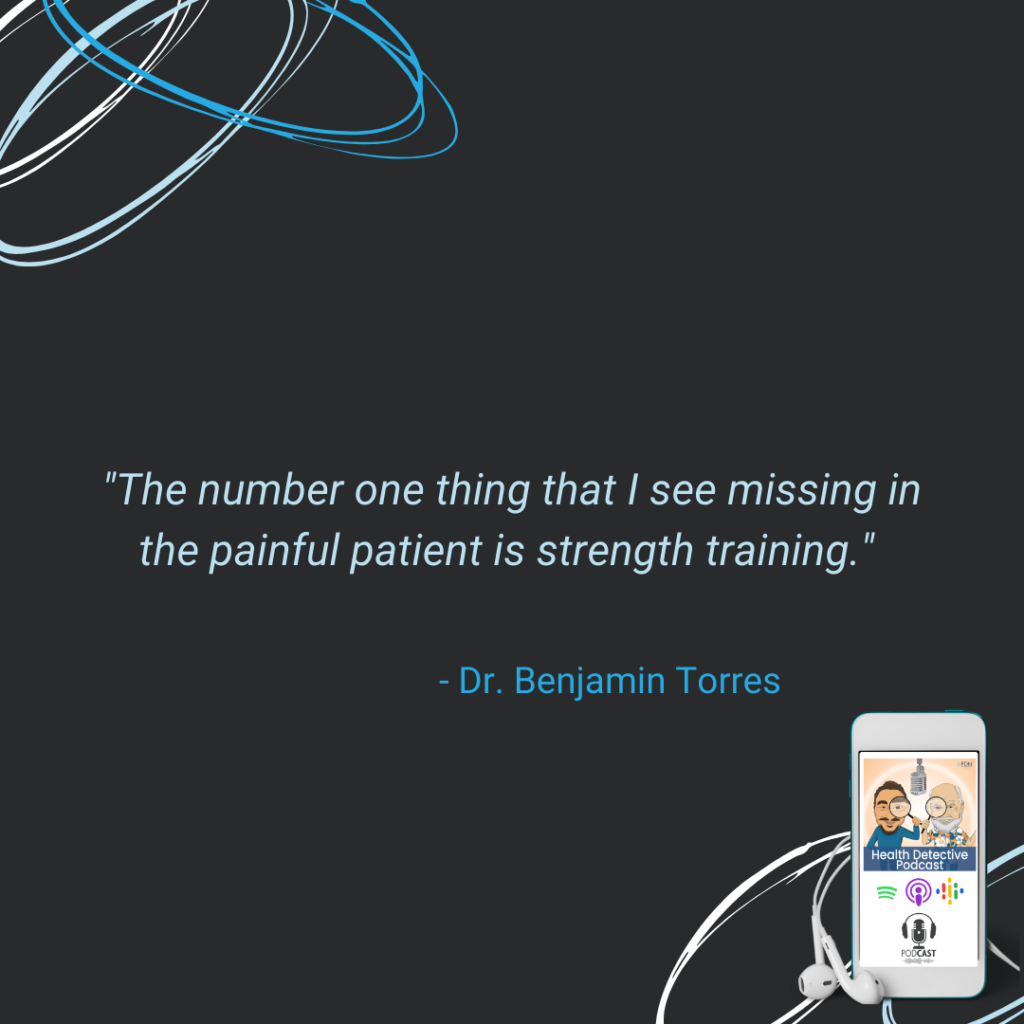
[00:37:49] Dr. Benjamin Torres: Great question. The number one thing that I see missing in the painful patient is strength training. The amount of times that I have gotten onto a call and talked to somebody, and they said, I saw my doctor, I saw a chiropractor. I saw a physical therapist. I followed up with another chiropractor, another physical therapist. I went to an orthopedic. I went to a neurologist, and not once did they exercise in these visits.
I’m thinking to myself, how did these practitioners actually manage to neglect the most important and most valuable and most well researched aspect of physical health, which is exercise, when we’re talking orthopedics.
Primary Therapeutics for Work-From-Home Entrepreneurs
That is the simplest thing that I can say is that most people, when they are experiencing pain, that’s coming from an orthopedic space, movement should be your initial medicine. It’s not anti-inflammatories, it’s not heat therapies. It’s not an E-stim or a massage or an adjustment.
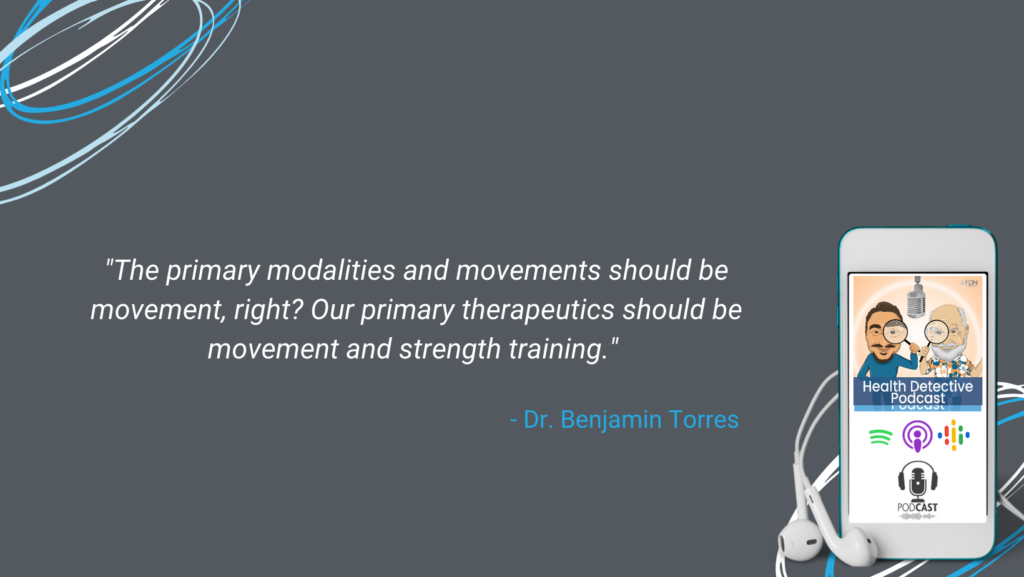
These should not be the primary modalities. That’s not where our therapeutics should be. The primary modalities and movements should be movement, right? Our primary therapeutics should be movement and strength training. Even when I look at the individuals who are prescribed some movement, in the vast majority of cases, it is way too low level.
My niche is the younger population. It’s individuals 20 to 40. That’s my niche. Older individuals, the table exercises, simple movements because they are really not attenuated to exercise, can be valuable to get them moving. Having a 25-year-old athlete lay on a table and stretch out his hamstrings with a band for 10 minutes of your session, or do knees to chest for minutes of your session while he is laying on a table, what are we doing here?
He came to you to get back to running or football or training or whatever it may be. What are we doing laying on a table for 20 minutes of this program? Oh, my goodness gracious. So how low level these movements are and how simple and basic they are from the average therapist or chiropractor, or personal trainer may be, not nearly enough and not challenging the individual nearly enough.
Modify & Adjust Movements to Be Non-Painful for Work-From-Home Entrepreneurs
Then where you need to get specialized with it, this is where the customization comes in, is most people are going to have pain. If they’re in pain and you’re going to challenge them, they’re going to have pain.
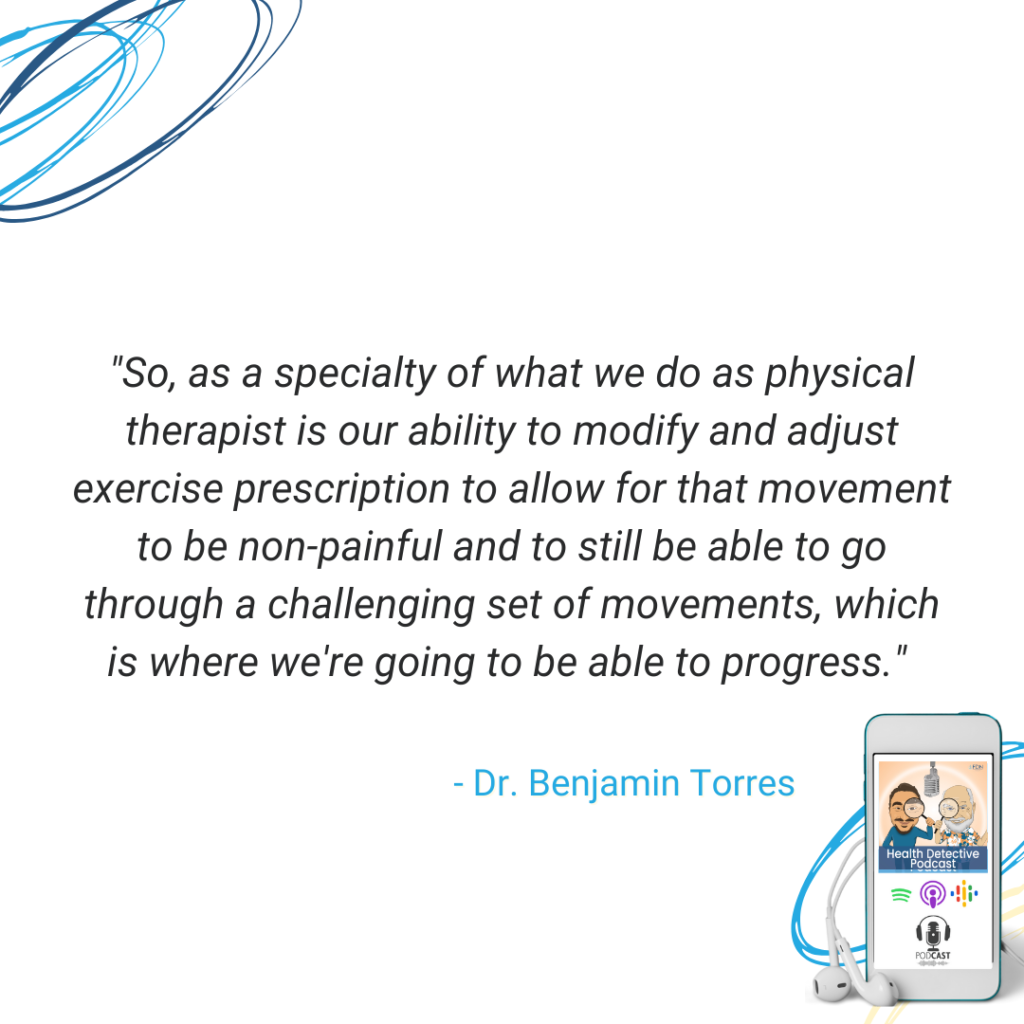
So, as a specialty of what we do as physical therapist is our ability to modify and adjust exercise prescription to allow for that movement to be non-painful and to still be able to go through a challenging set of movements, which is where we’re going to be able to progress. That’s where the customization comes in that would be impossible to say on this call for a generalized population.
But yeah, that’s the main thing. Most people aren’t strength training at all.
[00:40:28] Detective Ev: You’re so well versed in the body building stuff and lifting. Have you ever heard of the program called Starting Strength by Mark Rippetoe?
[00:40:35] Dr. Benjamin Torres: No. Although I do know Mark. I’ve seen his name a bunch of times, but I’ve never really looked into any of his stuff.
[00:40:39] Detective Ev: No worries. It’s not that important.
He’s famous for his basic strength training program though for novice lifters specifically like people who have perhaps never picked up. And it’s a fascinating program. I mean, you’re squatting three by five, three times a week. Now this is just in the beginning, right?
You alternate between overhead press and bench three by five, and then you do one set of deadlifts. Now this is not including warmups for any of this, but one set of deadlifts for five reps. And you’re literally progressing that for months, like six, seven months. What’s fascinating that you mentioned this, Ben, is cause you know I have that lower back thing because of the scoliosis.
Work-From-Home: Strength-Training Out of Pain
One of the things that helped me the most was two years ago during the pandemic, when I’m not working as much, I feel like it’s tough. Cause I’m obsessed with work, you know that. I don’t know if it’s just because the health issues or whatever. It’s not that I ever trade exercise, but it’s very tough for me to go the 70 hours a week that I like to do and then mix in like a legitimate five day a week workout program without just feeling shot. Like my body, it’s too much. Honestly, I’ll take the work every single time.
But now me though, I have the opposite problem of most people. I don’t gain excessively in fat when I stop working out, I lose all my weight. I get skinnier. So, when I did Starting Strength, though, it was so simple, it was a novice program. It was exactly what I needed.
I mean, my squat was mid two hundreds for three by five, which for me was good, you know? I’m benching over 225 for the first time. Like, I’d never done these things. But my back pain, Ben, was like nonexistent during this time. Every one of these chiropractors that I had. I love them. God forbid any were listening, no disrespect. They were told with their training, that I should be someone that never even squats again. They said I could deadlift, but not squat.
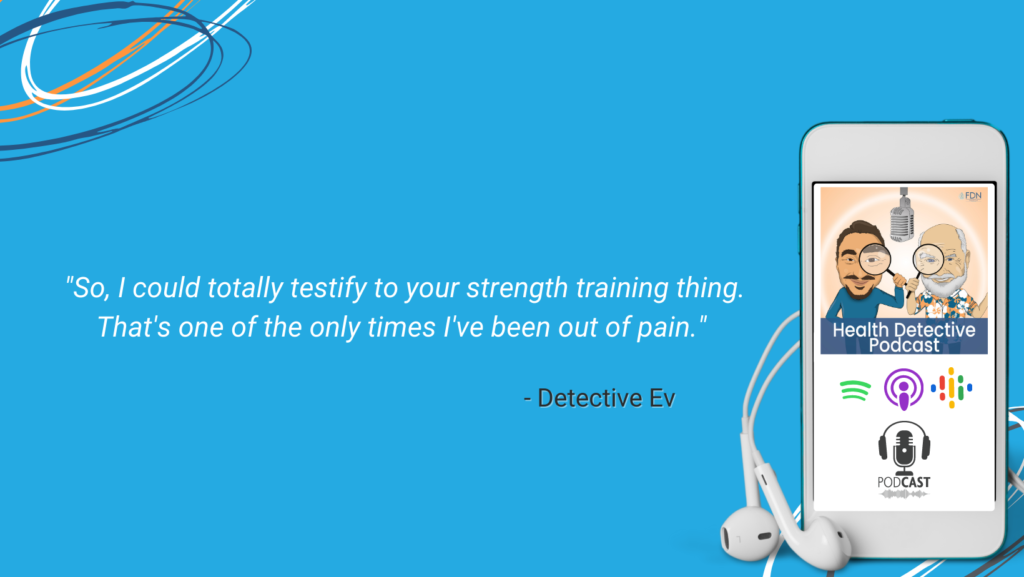
And like low bar squatting, not even high bar has been one of the best exercises for my back that I’ve ever done and made me feel great. So, I could totally testify to your strength training thing. That’s one of the only times I’ve been out of pain.
Work-From-Home Entrepreneurs, Take Strength Training Slowly
[00:42:18] Dr. Benjamin Torres: Two things I want to say. One, 99.9% of the time when a doctor or somebody tells you, any idiot tells you that you are not allowed to squat or that deadlifts are not a good movement for you, really means, I don’t know how to get you to be able to do that again.
Now there is a very small percentage of people whose injuries are so progressed, or maybe they’re of a certain age that that is not a reasonable set of movements for them, but that is a very low population. The vast majority of the population, what they’re really saying is, I don’t know how to build you back up to be able to do that.
That’s the other point that I wanted to get at. No client of mine gets a barbell deadlift in week one, gets a barbell anything in month one. Everything I do is to rebuild this process for them to maybe be able to do that again. If that is not their goal, they don’t want to get back into barbell strength training movements, no problem. We can do all sorts of free weight style movements and get amazing strength training benefits. Then go do whatever your goal is, whether it’s triathlon people or marathon runners or just a gym rat. It doesn’t have to end in barbell training.

Strength training can come from a very versatile set of movements. But a lot of people who come to me want to be able to get back to a barbell squad or something like that. Building up to that sometimes takes two months, three months, sometimes, before I even introduce a barbell for any movement.
Work-From-Home Entrepreneurs: Studies Report Strength Training Eliminates Pain
So, I think it’s important to note, strength training is the most important thing that I think everybody is missing inside their programs and something that it’s unreal how little we’re doing of it in the therapeutic space that needs to be done.
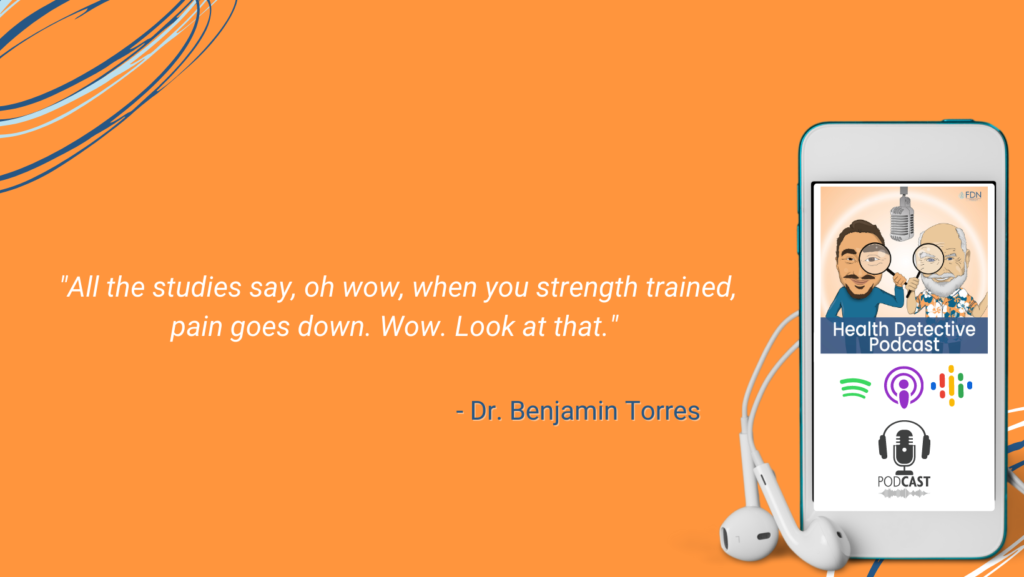
Just like you said, all of a sudden, your back pain is gone. Yeah. I wonder why? And all the studies say it too. Oh my gosh. All the studies say, oh wow, when you strength trained, pain goes down. Wow. Look at that. Oh, chronic issues go down. When you guys, when you strength train for orthopedics. Oh my goodness. Yet, we’re not doing it.
But a lot of times people will have pain with doing barbell style movements. It takes a while to build up to that. That’s where things really get detailed and customized for the individual.
[00:44:06] Detective Ev: This is what’s cool about these podcasts. Like I really just try to dissect like one or two really cool things.
I think just, even in my head now, the way I approach this type of training, I mean this seriously, even this winter. I know I’m going to get busy again. I know how this goes. Like right now in the summer, all the time. We’re going to the gym today, right before we go to the beach cause we’re in Vermont.
But as soon as that winter starts, I’ll be like, I’m working like 10 days straight right now, 12, 13 hours a day. No, I’m not going to go to the gym during that time typically. But maybe I’ll think about that a little differently now knowing what it could do for the back pain, because the more I work, the more I drive too. And then it’s a nightmare.
Client Success Story: Post-surgeries ACL Tear Recovery
This sounds like a pretty solid plan here and solution.
With the last several minutes that we have, I want to obviously cover where people can find you. But before that, I want to just hear like maybe a really cool client testimonial. You’ve worked with so many people, you’re a phenomenal storyteller.
I’m curious about someone that might have come to you and they’re at the end of their rope, no one has been able to help them in the conventional sense. They finally came to you, and you helped them achieve what they wanted to achieve. So, are there any stories like that, that stick out?
[00:45:05] Dr. Benjamin Torres: A lot. That’s almost like my common patient. I’m not the step one guy. Nobody comes to me as their first referral. They get back pain for the first time ever and they come to me. Every once in a while, sure. But that’s a rarity.
Most people come to me cause they’re like, I’ve tried a bunch of different things. I don’t know what else to do. You look like a specialist. How can you help me? I see that all the time. A couple of cases that are the unique ones. I saw an individual, we just stopped working together, who had had four ACL reconstructive surgeries on one knee. All four of them retore.

She came to me like, I don’t know what to do at this point. So, we were doing a lot of prehab for a possible resurgical procedure. Watching her progression in her movement was incredible. I mean, she can swim, she can go for a jog. She can do weighted squats now, and this is without an ACL after four reconstructions. That’s pretty cool to see.
Client Success Story: Lumbar Surgical Patient
I also had an individual who came to me, lumbar surgical patient. Never went through the therapies cause of COVID. Symptoms are through the roof. Was rescheduling a surgical procedure, this is a recent client. Sciatica style symptoms, ridiculous pains. Couldn’t get through the day.
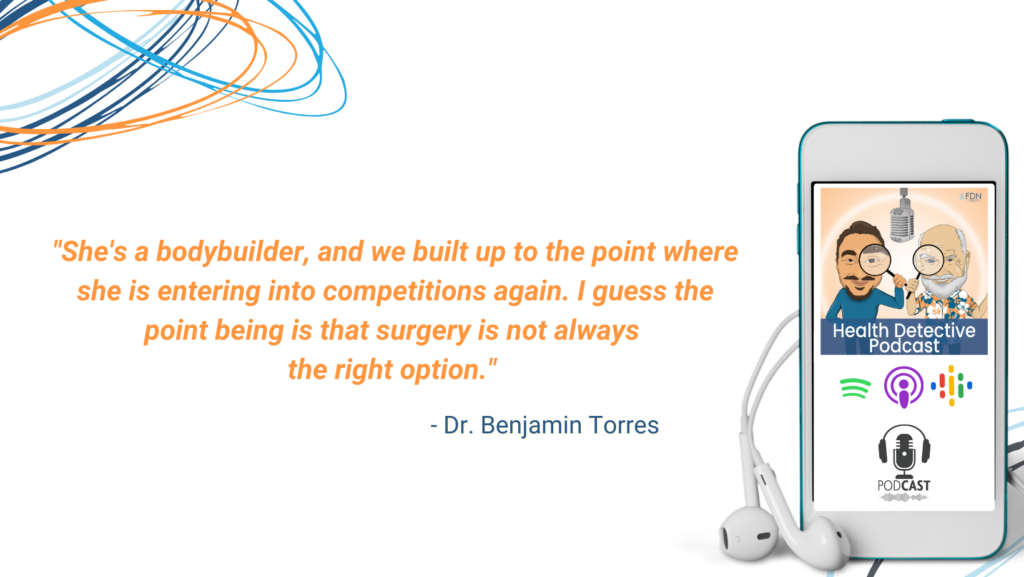
She’s a bodybuilder, and we built up to the point where she is entering into competitions again. I guess the point being is that surgery is not always the right option. And if you haven’t given conservative therapies a real effort and a real chance, you should probably take a look at it before you go down opioids, cortisone injections, and surgical procedures.
And that’s not that uncommon of a patient.
[00:46:33] Detective Ev: You really are like the physical therapy equivalent of what we’re doing. Because even just what you said about, you’re not the first person that people go to. If nothing else, I just hope that the people that are listening today, especially, are people that are already practitioners or are training to be practitioners.
This should just be a cool tool in your tool belt. I mean, yes. I understand that it’s more than insurance, but for what you offer is very affordable. I think, it’s very fair. You add a lot more than just the knowledge. There’s something to be said about someone who can actually be personable and charismatic and motivating with their personality.
Like some people are brilliant and very dry. There’s nothing wrong with that, but it’s not the same as someone who can be relatively brilliant and also good with people. That’s important for motivating people and getting them on the calls and keeping them going here.
Where to Find Dr. Benjamin Torres
So where can people find you if they either wanted to work with you or just, hey, Ben, I’d love to be able to refer people to you if I’m an FDN?
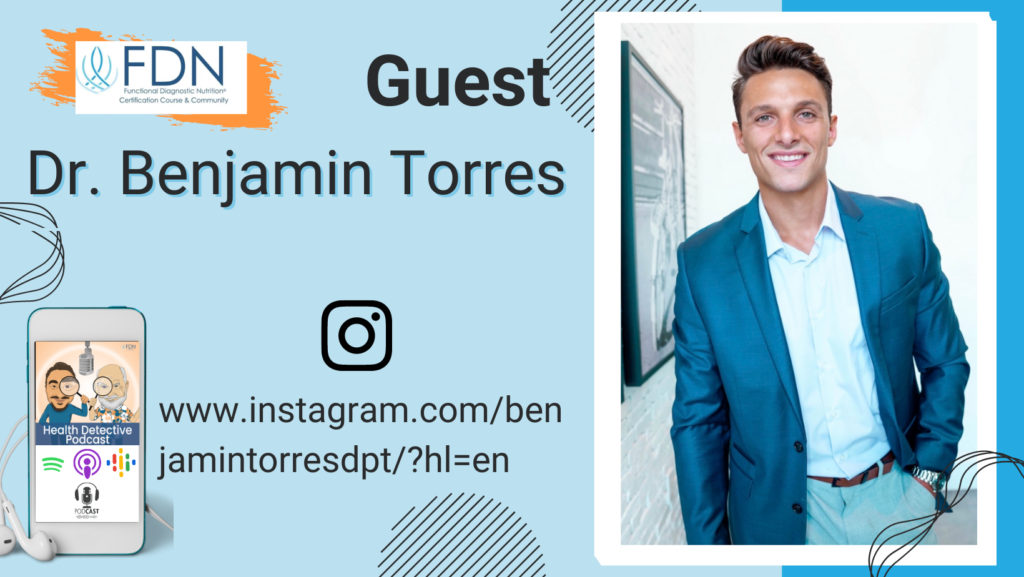
[00:47:17] Dr. Benjamin Torres: The best place is going to be Instagram. That’s where I do the vast majority of my content. I’m constantly on there. I have somebody who’s also making sure that the messages are answered on there to help me and funnel things to me.
So, if you reach out to me on my Instagram at benjamintorresdpt as in Doctor of Physical Therapy, benjamintorresdpt, I will easily get back to you. I’ll get back to you with a smile. Even if it’s just, hey, I listen to the podcast, it was awesome. I’ll happily get back to you.
Then if you have any questions, comments, or concerns, I’m more than happy to respond with some answers. And if we ever needed to set up a call it’s not a problem. That’s what I’m there for.
[00:47:47] Detective Ev: We’ll have that in the show notes as well.
Not to be confusing, but something I wanted to mention just cause I think it’s cool. We’ll just plug it briefly at the end here. Ben, obviously you guys can tell from the story, made a transition from an in-person physical therapist to someone doing this completely online, traveling while still being able to do the work.
It’s the aspiration of virtually every FDN is to work virtually. We do offer a lot of business support now, post graduating with FDN. But we’re not opposed to anyone working with anyone. We shout out other people all the time.
Ben’s Online Business Coaching
Just so you know, Ben is also someone who helps people that are like healthcare professionals that are trying to get into the space of doing this stuff online, actually be able to do that. And, dude, you’ve had a ton of success. I mean, what are you at now? Like 105,000 people on Instagram, completely organic, right? We’re not buying these from China or something.
[00:48:32] Dr. Benjamin Torres: I’ve had multiple people surpass that, that have gone through my coaching. I’ve brought people from 1,800, 700 followers or less that have far more than me, 120,000, 150,000, 180,000, 200,000 followers in a couple of month-long period that go through my program and my coaching.

But the most important part of that is, that’s great and everything don’t get me wrong. There’s value to social media nowadays. But transitioning that into something that is actually spitting off income for you to be able to quit a job that maybe you don’t like, or a job that is not fulfilling you, or go part-time, or pursue a passion because your income is there online and you have enough that you can just go do what you want, that’s what I love to do.
That’s really where I almost favor my business coaching with people over my patients because I see so much of myself in them when I watch their life change. I’m like, yes, you know, it gets me so excited to watch them get onto the online realm.
Also then I know, they’re outside of the broken system, helping people. That makes me happy to.
Leveraging Social Media to a Business Model
[00:49:28] Detective Ev: And this isn’t just physical therapist, right? I can reach out to you as an FDN.
[00:49:32] Dr. Benjamin Torres: Yeah. Right now, I have a dietician. I have an occupational therapist. You know, I’ve seen traditional orthopedics. I’ve seen a bunch of chiropractors, lot of physical therapists. As long as you’re willing to put in effort, you want to start a business, I’m willing to help.
[00:49:45] Detective Ev: I like that you mentioned that part about the end because there’s a difference between getting the following. There’s a lot of, let’s be honest, great looking people out there, men and women, that get huge followings. That doesn’t mean they’re making a dime.
This is what people don’t get. There’s people with 10,000 followers that are making a quarter million dollars a year because they know how to actually advertise and use their audience appropriately and serve their audience. Versus someone with a hundred thousand, that’s still working a part-time job because they never figured out how to convert.
[00:50:10] Dr. Benjamin Torres: I should mention this. I have a client that’s, we don’t work together anymore, but up over 200,000 followers and has very little income, if any, coming in, cause they just decided to not monetize it. And I have somebody else who has 1500 followers, and another person has 2,500 followers that is making a massive chunk of change.
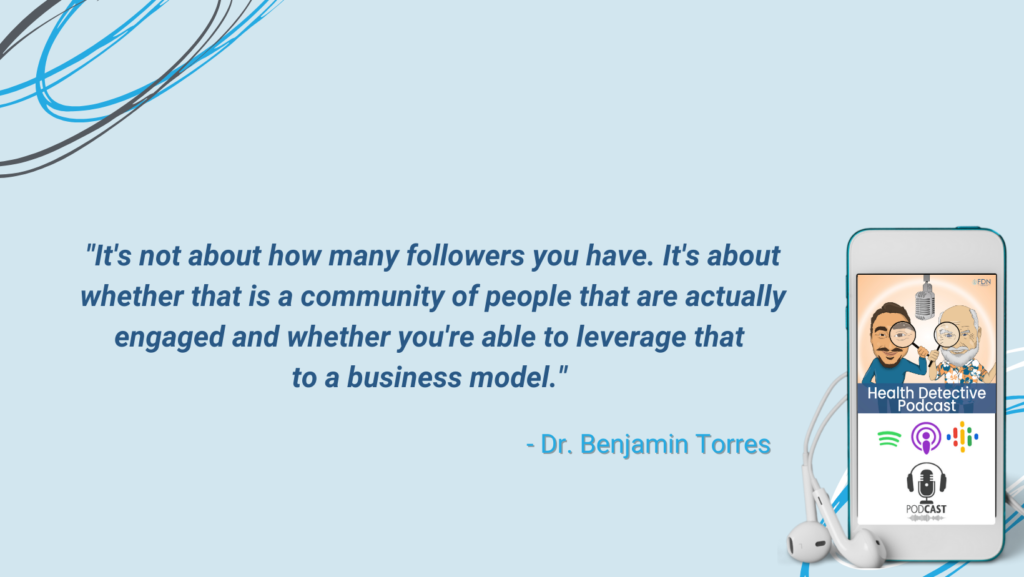
It’s not about how many followers you have. It’s about whether that is a community of people that are actually engaged and whether you’re able to leverage that to a business model. And that’s really what I teach people to do.
Health Detective Podcast Signature Question
[00:50:37] Detective Ev: I want to finish up today Ben, with the signature question that we have on the Health Detective Podcast. And this is cool. We’ve had like a shocking amount of unique answers considering I’ve asked probably 130, 140 people at this point.
And I’m curious what yours will be. The question for us to finish up is if I could give you in this case, a magic wand and you could get every single person in this world to do one thing for their health, whether that’s literally do one thing or stop doing one thing, what’s the one thing you’d get ’em to do?
[00:51:12] Dr. Benjamin Torres: Oh man, you know what? Before I got on this, I knew you were going to ask me one of these questions. And I was like, I should really listen to the end of one of these podcasts, so I know what the question is and I didn’t. Now I’m on the spot. If I could recommend somebody does one thing for their health…

I think the number one thing that I’d recommend somebody does is walk. Almost anybody can do it regardless of where their functional level is. There is tons of research that says it has therapeutic value for a vast amount of conditions. And you could do a lot of things during that walk whether it’s listening to a podcast like this to better yourself, whether it’s breathwork, whether it’s score strength, whatever it may be, there’s so much you can do within that.
Walking has such a diverse amount of benefit. If I had to just say one thing for everybody to do regularly, I’d say walk.
Conclusion
[00:51:58] Detective Ev: All right, guys, that’ll do it for today’s episode with my friend, Dr. Benjamin Torres. He is on Instagram at Benjamin Torres with two RS, D P T. There’s a few ways that you guys can kind of utilize him that I was thinking about when I invited him on the podcast. One, I mean, I guess you could work with him directly
if you’re someone that feels, there’s an issue with the physical side of things for you and I don’t mean your gut health. I know we got that covered. But the structural stuff, right? You got to make sure that’s under control. In addition, he could be a great referral person cause he sends me clients sometimes. He’s really good at that. You could develop a relationship there.
Or finally, although we have wonderful business training at FDN, he is also someone who’s kind of mastered the social media side. And if that’s something you’re interested in, then remember he does offer that as well, even though we didn’t talk about that extensively today. So, it is @benjamintorresdpt on Instagram. That is the best place that you can reach him.
I want to thank you so much for listening to today’s episode. If you like the information that we’re sharing and the diversity of guests, please consider leaving us a five-star review on Apple and or Spotify. If you would do that, we would love ya even more than we already do.
Please take care, have a great rest of your week. I’m looking forward to talking to you guys again soon.
You can always visit us at functionaldiagnosticnutrition.com.
To hire a coach, go to fdnthrive.com.
For a free Health Review, go to fdnthrive.com/match.

